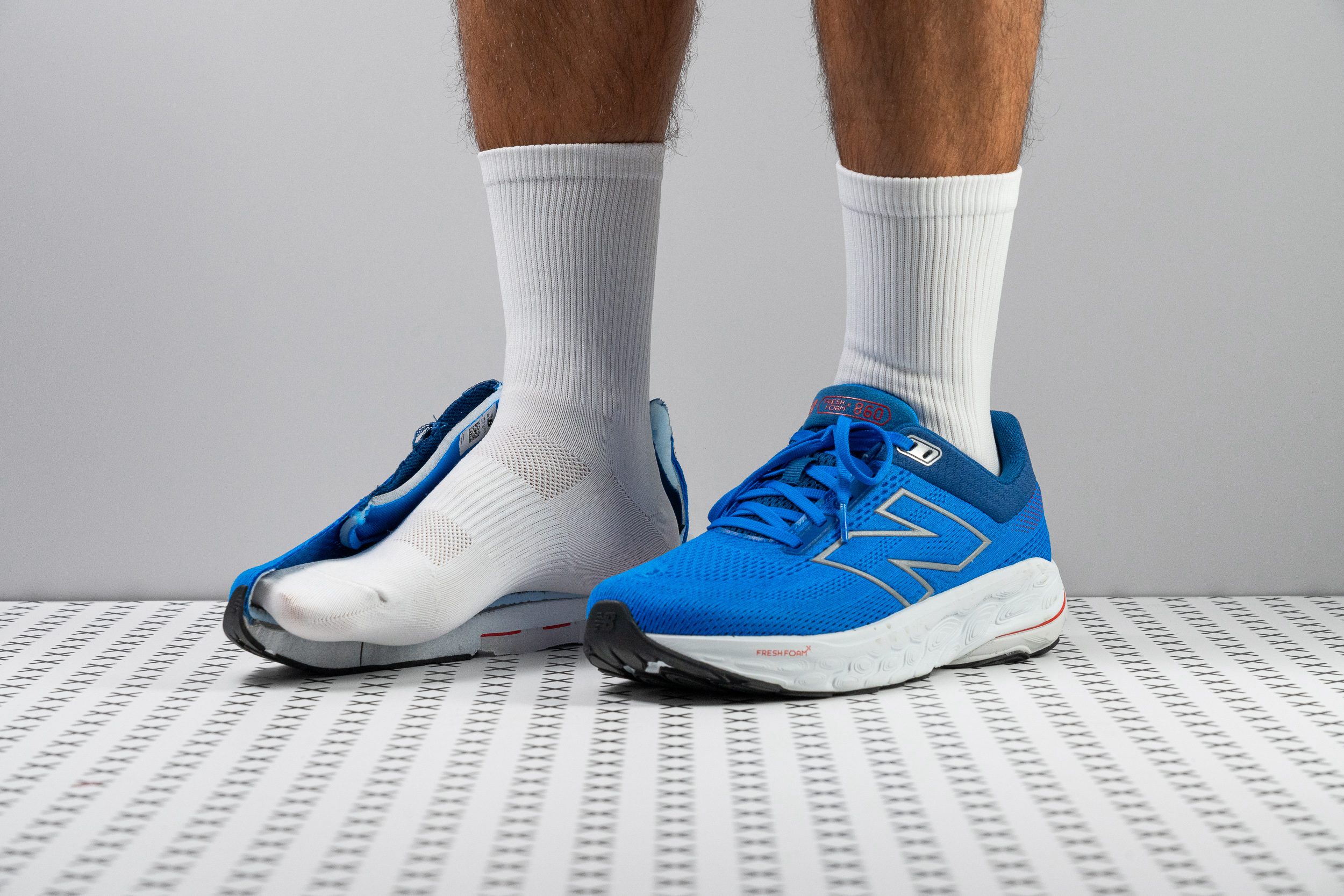Our verdict
- Top pick in best New Balance running shoes
Pros
- Innovative, dual-layer midsole
- Great for short and mid-distance runs
- Ideal for heel strikers
- Comfortable for casual use
- Good value
- Reliable for daily mileage
- Great outsole coverage
- Superb lockdown
- Reflective elements
Cons
- Limited breathability
- Upper lacks durability
- Could be lighter
Audience verdict
- Top 11% most popular running shoes
Comparison
The most similar running shoes compared
+ + Add a shoe | |||||
|---|---|---|---|---|---|
| Audience score | 85 Good! | 88 Great! | 88 Great! | 80 Good! | |
| Price | $140 | $170 | $150 | $125 | |
| Pace | Daily running | Daily running | Daily running | Daily running | |
| Shock absorption | Moderate | - | Moderate | High | |
| Energy return | Moderate | - | Low | Moderate | |
| Traction | High | - | High | High | |
| Arch support | Stability | Stability | Stability | Stability | |
| Weight lab Weight brand | 10.4 oz / 295g 10.5 oz / 298g | 11.6 oz / 329g 11.8 oz / 334g | 11 oz / 312g 10.9 oz / 309g | 8.1 oz / 231g 8 oz / 228g | |
| Lightweight | ✗ | ✗ | ✗ | ✓ | |
| Drop lab Drop brand | 9.3 mm 8.0 mm | 7.2 mm 8.0 mm | 5.6 mm 6.0 mm | 9.4 mm 5.0 mm | |
| Strike pattern | HeelMid/forefoot | HeelMid/forefoot | Mid/forefoot | HeelMid/forefoot | |
| Size | Slightly small | True to size | True to size | Slightly small | |
| Midsole softness | Soft | Balanced | Soft | Soft | |
| Difference in midsole softness in cold | Big | Normal | Normal | Big | |
| Toebox durability | Decent | Decent | Decent | Bad | |
| Heel padding durability | Bad | Bad | Good | Decent | |
| Outsole durability | Decent | Good | Good | Bad | |
| Breathability | Moderate | Moderate | Warm | Breathable | |
| Width / fit | Medium | Medium | Medium | Narrow | |
| Toebox width | Medium | Wide | Medium | Narrow | |
| Stiffness | Moderate | Stiff | Moderate | Moderate | |
| Torsional rigidity | Moderate | Stiff | Moderate | Stiff | |
| Heel counter stiffness | Stiff | Stiff | Stiff | Stiff | |
| Rocker | ✗ | ✗ | ✓ | ✓ | |
| Heel lab Heel brand | 36.8 mm 38.0 mm | 39.1 mm 41.0 mm | 36.1 mm 35.5 mm | 36.0 mm 33.0 mm | |
| Forefoot lab Forefoot brand | 27.5 mm 30.0 mm | 31.9 mm 33.0 mm | 30.5 mm 29.5 mm | 26.6 mm 28.0 mm | |
| Widths available | NarrowNormalWideX-Wide | NormalWide | NormalWideX-Wide | NormalWide | |
| Orthotic friendly | ✓ | ✓ | ✓ | ✓ | |
| Season | All seasons | All seasons | Winter | SummerAll seasons | |
| Removable insole | ✓ | ✓ | ✓ | ✓ | |
| Ranking | #220 Bottom 42% | #136 Top 36% | #127 Top 34% | #318 Bottom 16% | |
| Popularity | #40 Top 11% | #301 Bottom 21% | #38 Top 10% | #56 Top 15% |
Who should buy
We believe the New Balance Fresh Foam X 860 v14 is a standout choice for:
- Runners with moderate stability needs who want a versatile daily trainer that easily transitions into a supportive walking shoe.
- Those seeking plush cushioning without sacrificing support or durability in a stability shoe.
- Fans of the 880 or 1080 series looking for more stability while maintaining the familiar comfort and cloud-like feel of Fresh Foam X.
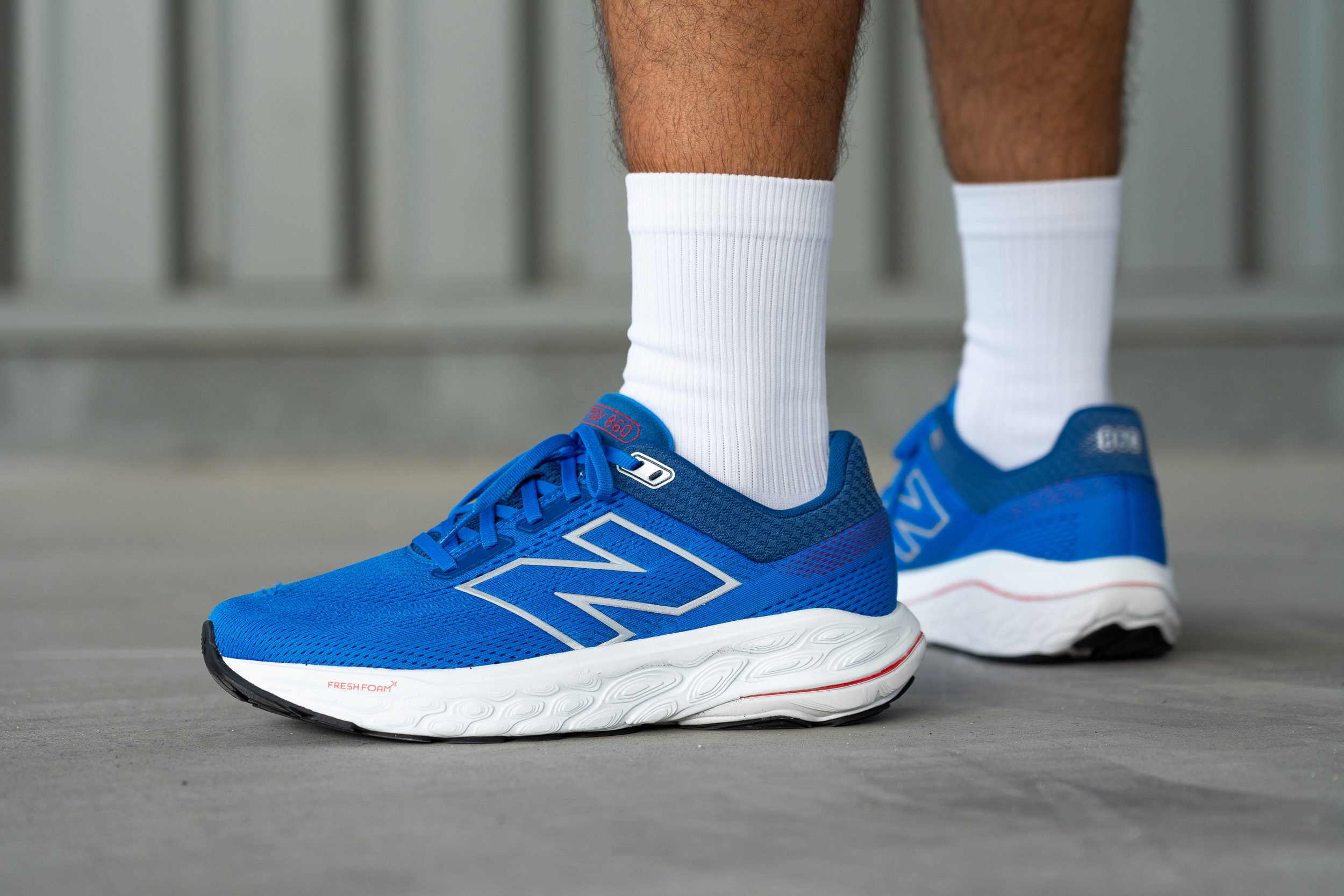
Who should NOT buy
The New Balance Fresh Foam X 860 v14 has a dual-layer midsole and an overly complex design that might not appeal to runners who prefer a simpler setup. We think the ASICS Gel Kayano 31 or the ASICS GT 2000 13 are better options for those with moderate stability needs who want a more reliable, predictable ride.
In our lab tests, we found that the durability of the 860 v14 falls short, which is a concern. If that's a dealbreaker for you, the New Balance Fresh Foam X Vongo v6 offers a similar midsole setup with a more durable knit upper.
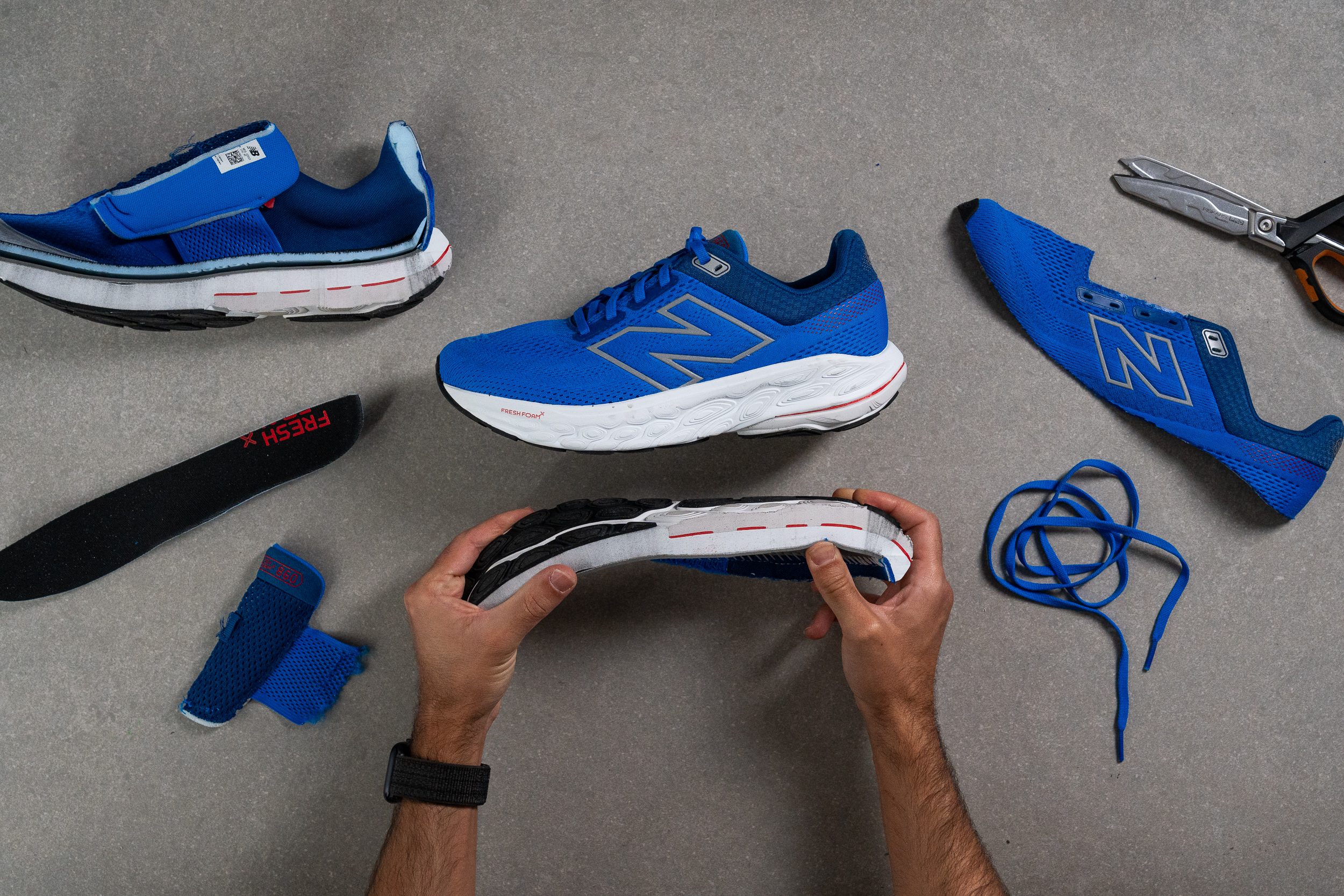
Cushioning
Shock absorption
Fresh Foam X has long been linked with reliable shock absorption, and the 860 v14 proves that once again. In our ASTM F1976 test, we measured 126 SA in the heel and 113 SA in the forefoot, plenty for daily runs regardless of body weight.
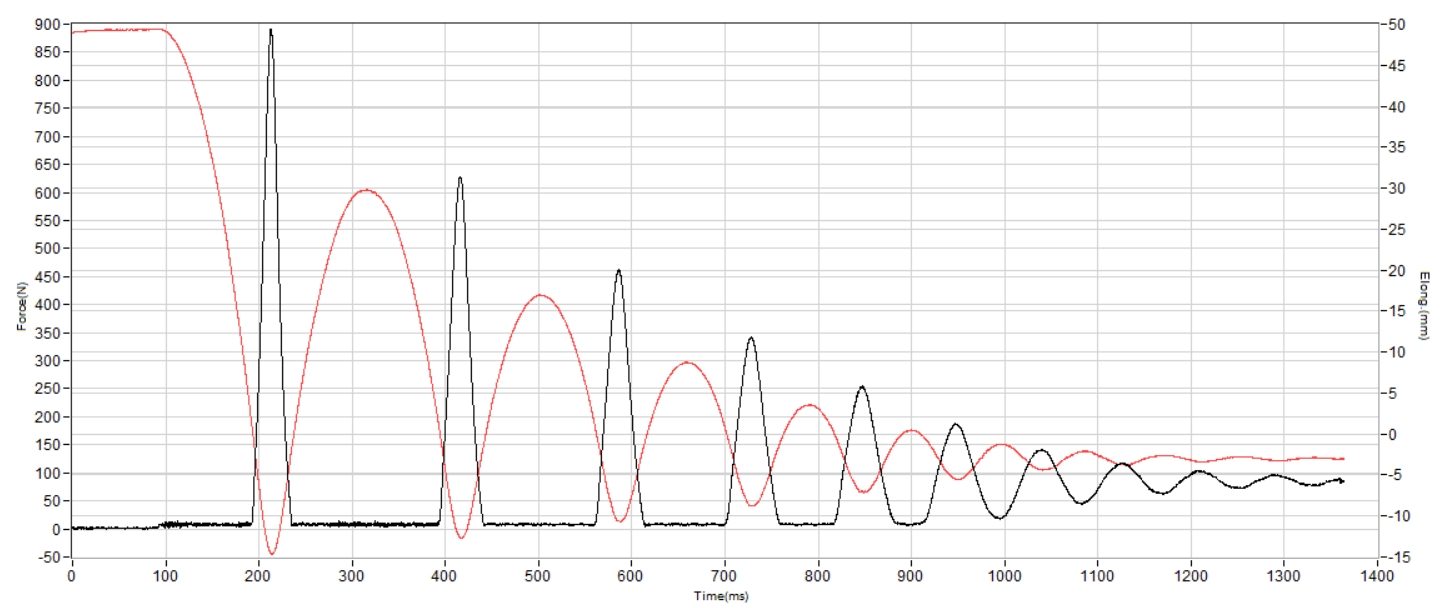
| Fresh Foam X 860 v14 | 126 SA |
| Average | 130 SA |
Energy return
Energy return was a welcome surprise—especially up front with 66.3%. The heel followed with a more modest 60.8%, yet still solid for daily training and ahead of many rivals in the same category.
| Fresh Foam X 860 v14 | 60.8% |
| Average | 58.6% |
Heel stack
The 860 v14 surprised us with its higher-than-expected stack height. At 36.8 mm in the heel, it’s even slightly more cushioned than the latest Vongo, which was a pleasant surprise during our testing.
We believe this makes the 860 an appealing choice for runners who crave extra cushioning in the rear without the added price and heft of the Vongo series. The 860 has a more balanced design, offering a substantial cushion underfoot while remaining lighter than its premium counterpart.
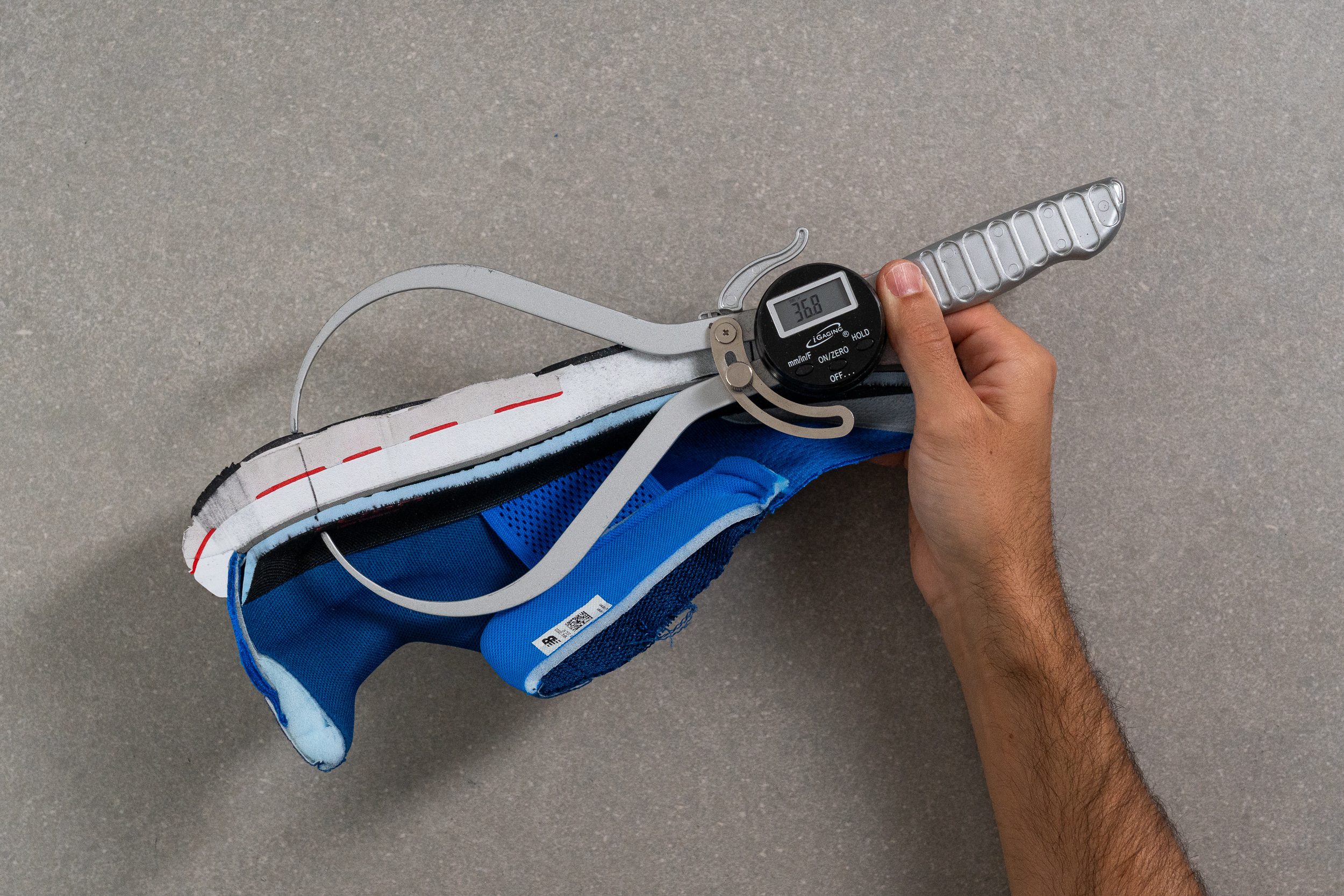
| Fresh Foam X 860 v14 | 36.8 mm |
| Average | 34.8 mm |
Forefoot stack
The forefoot sits just below the 30-mm threshold that many maximalist shoes now target. At 27.5 mm, we believe the height strikes a good balance, making the shoe capable of handling long runs for most runners.
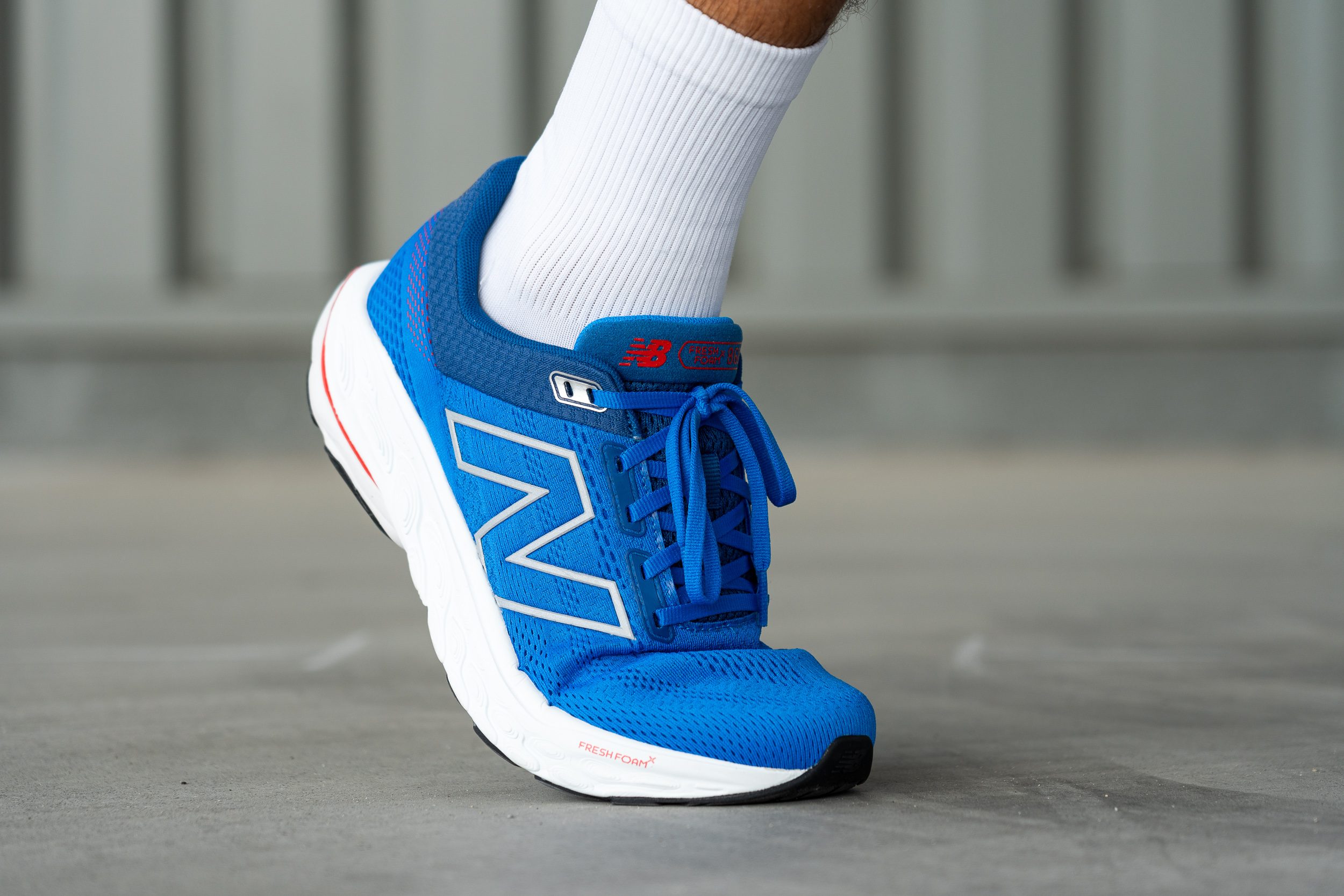
In our experience, this shoe provides sufficient cushioning for most runners, though it may feel a bit thin for heavy individuals. The lower profile creates a more grounded and responsive feel underfoot, making it a solid choice for a variety of paces.
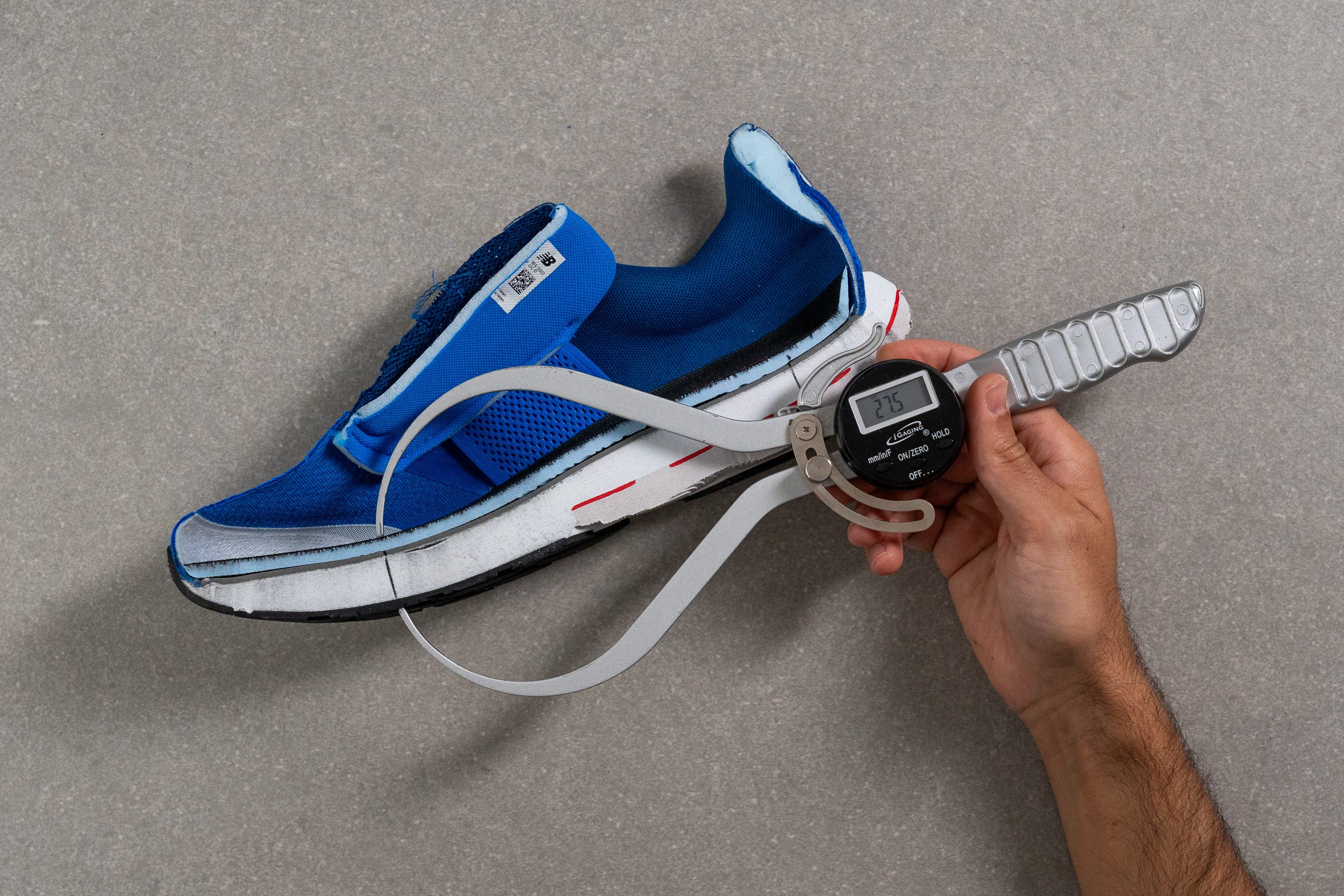
| Fresh Foam X 860 v14 | 27.5 mm |
| Average | 26.2 mm |
Drop
We were advised to expect an 8-mm drop, but our detailed measurements revealed 9.3 mm. This minor deviation doesn't affect the shoe's high-offset design, which works fantastically for heel strikers.
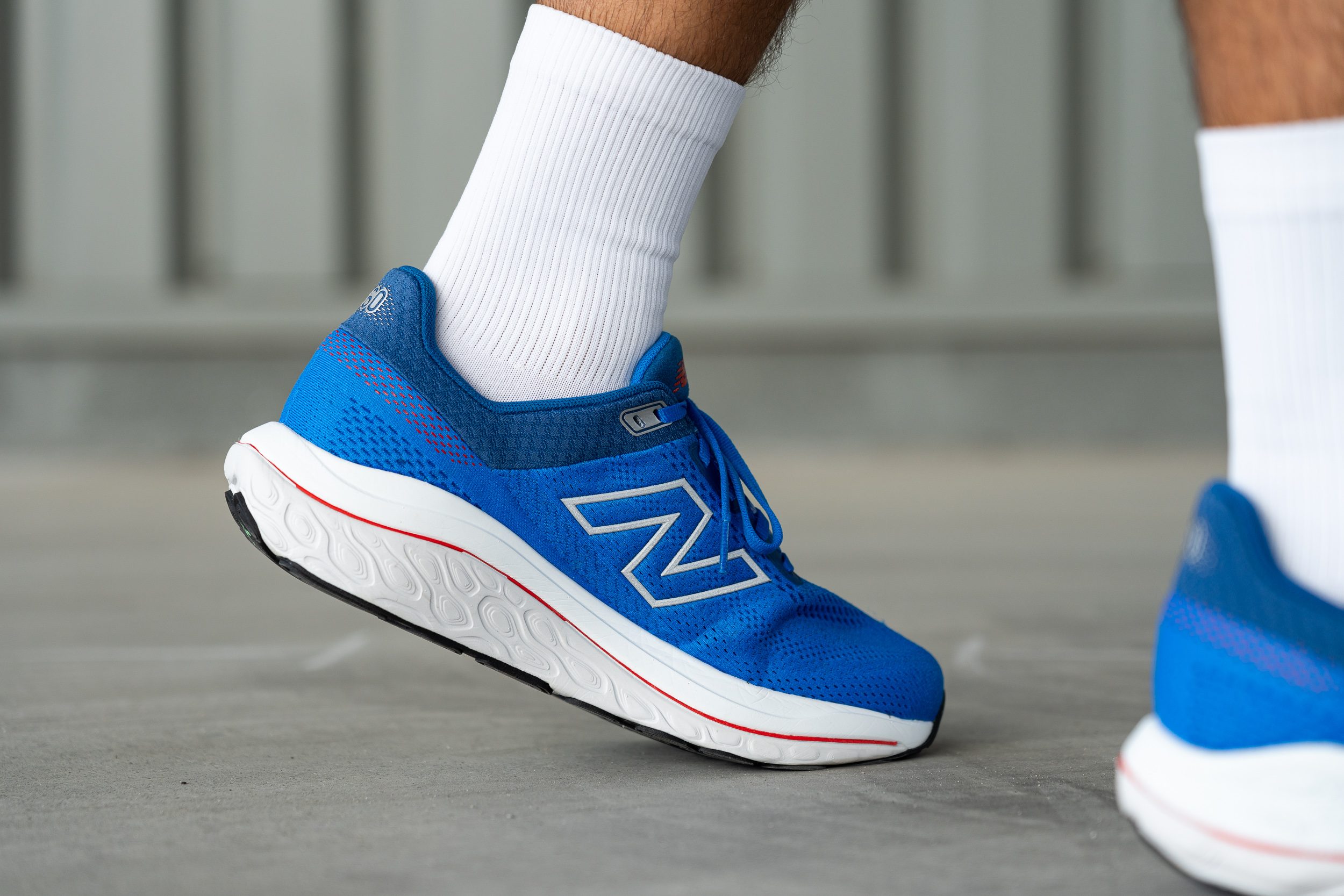
| Fresh Foam X 860 v14 | 9.3 mm |
| Average | 8.6 mm |
Midsole softness
UpdatedThe midsole of the New Balance Fresh Foam X 860 v14 is quite intriguing. Rather than using a single slab of foam, it features two different Fresh Foam X compounds.
The primary layer, with a softness rating of just 26.5 AC, runs full length below the footbed, providing the plush feel we all expect from Fresh Foam X. Meanwhile, there's a smaller, much firmer layer in the heel designed to enhance stability.
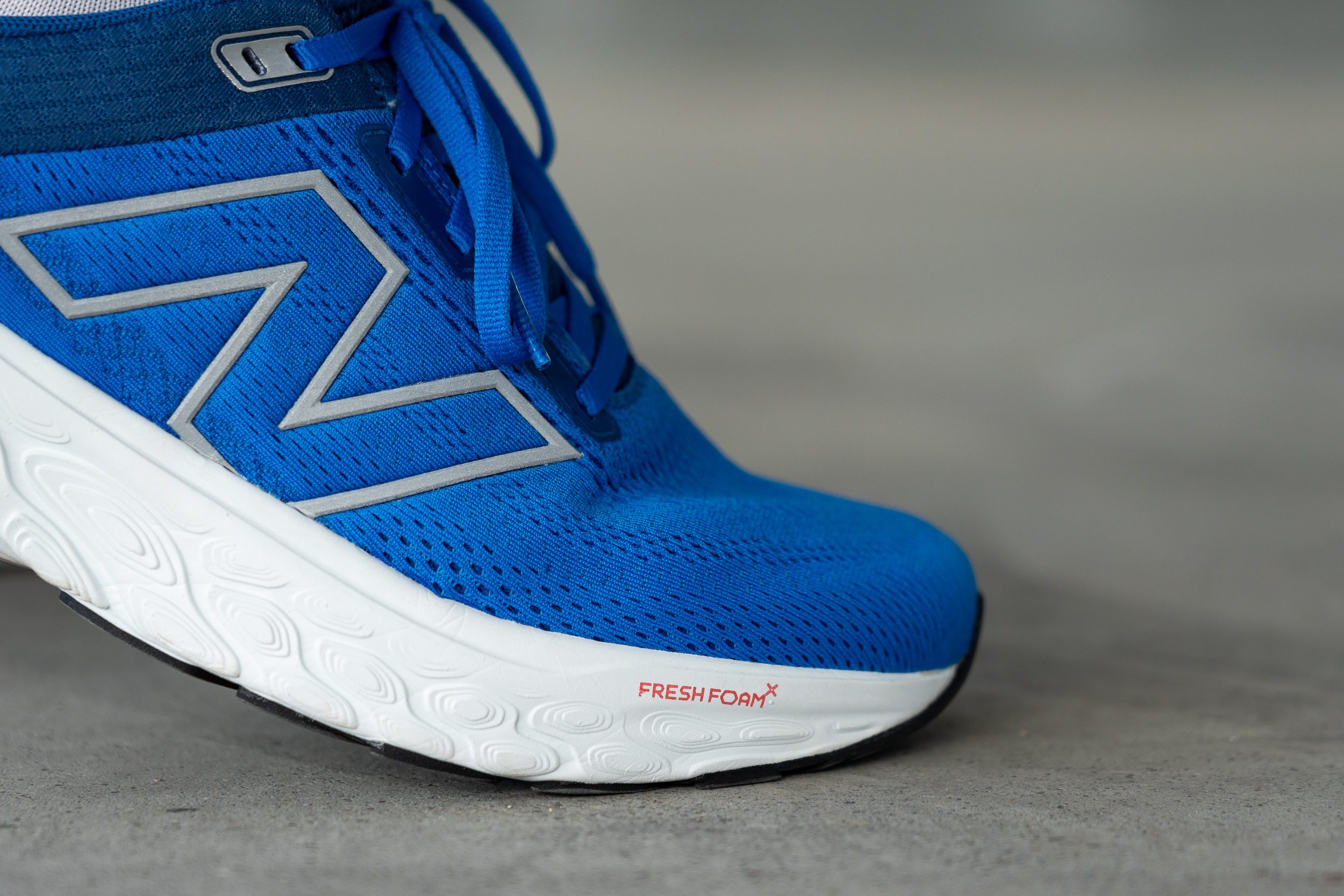
We believe that pairing this soft foam with the EVA Film plate and the firmer heel foam creates a balanced mix for both comfort and support, with moderate energy return. Fresh Foam X is, after all, an EVA foam—so don't expect an exhilarating ride here.
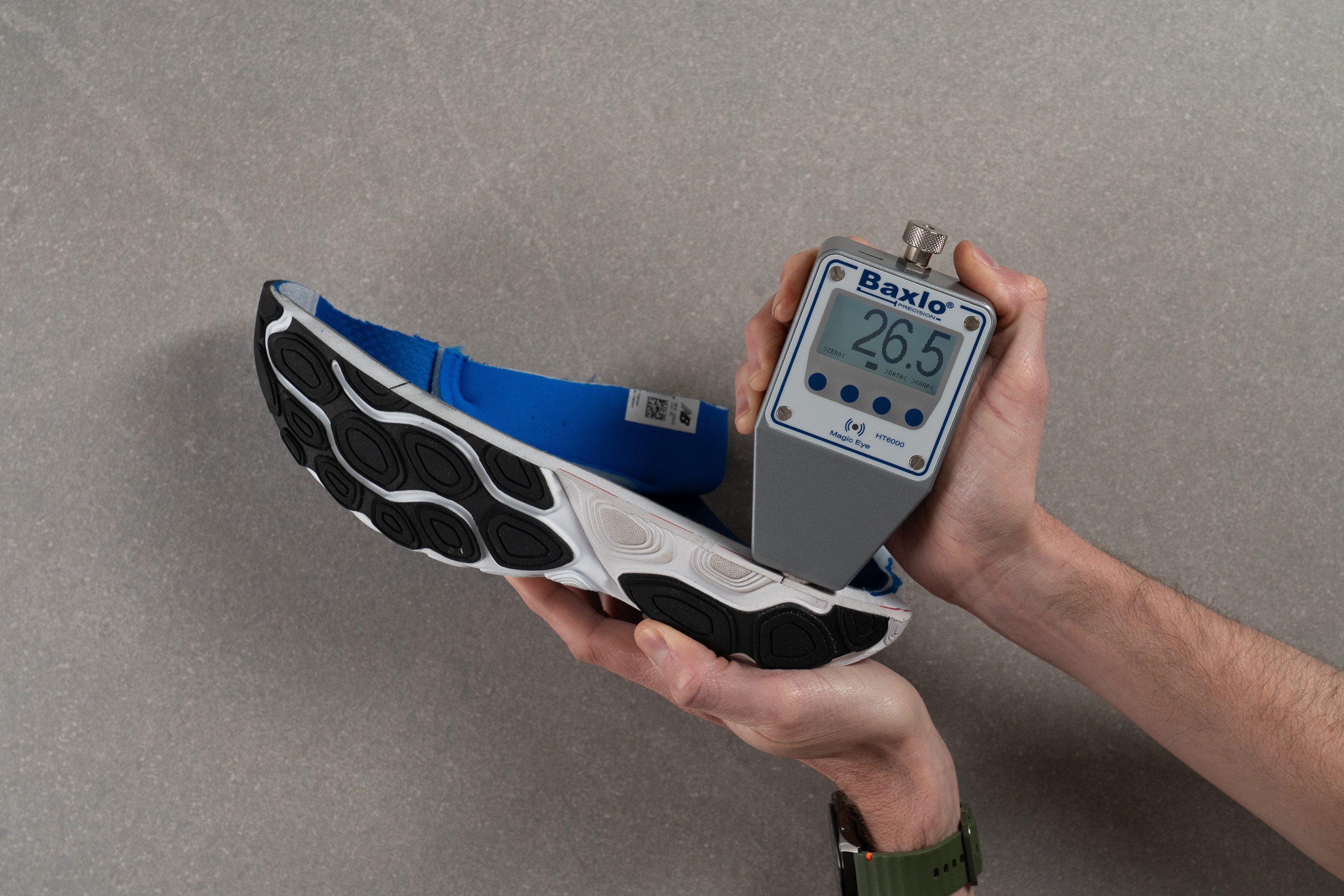
| Fresh Foam X 860 v14 | 26.5 AC |
| Average | 36.4 AC |
Secondary foam
UpdatedAs we mentioned earlier, the 860 v14 uses a dual-foam setup with two layers of Fresh Foam X. The first layer is ultra-soft, while the second—marked by a yellow arrow and slightly darker—runs from the midfoot to the heel and feels significantly firmer.
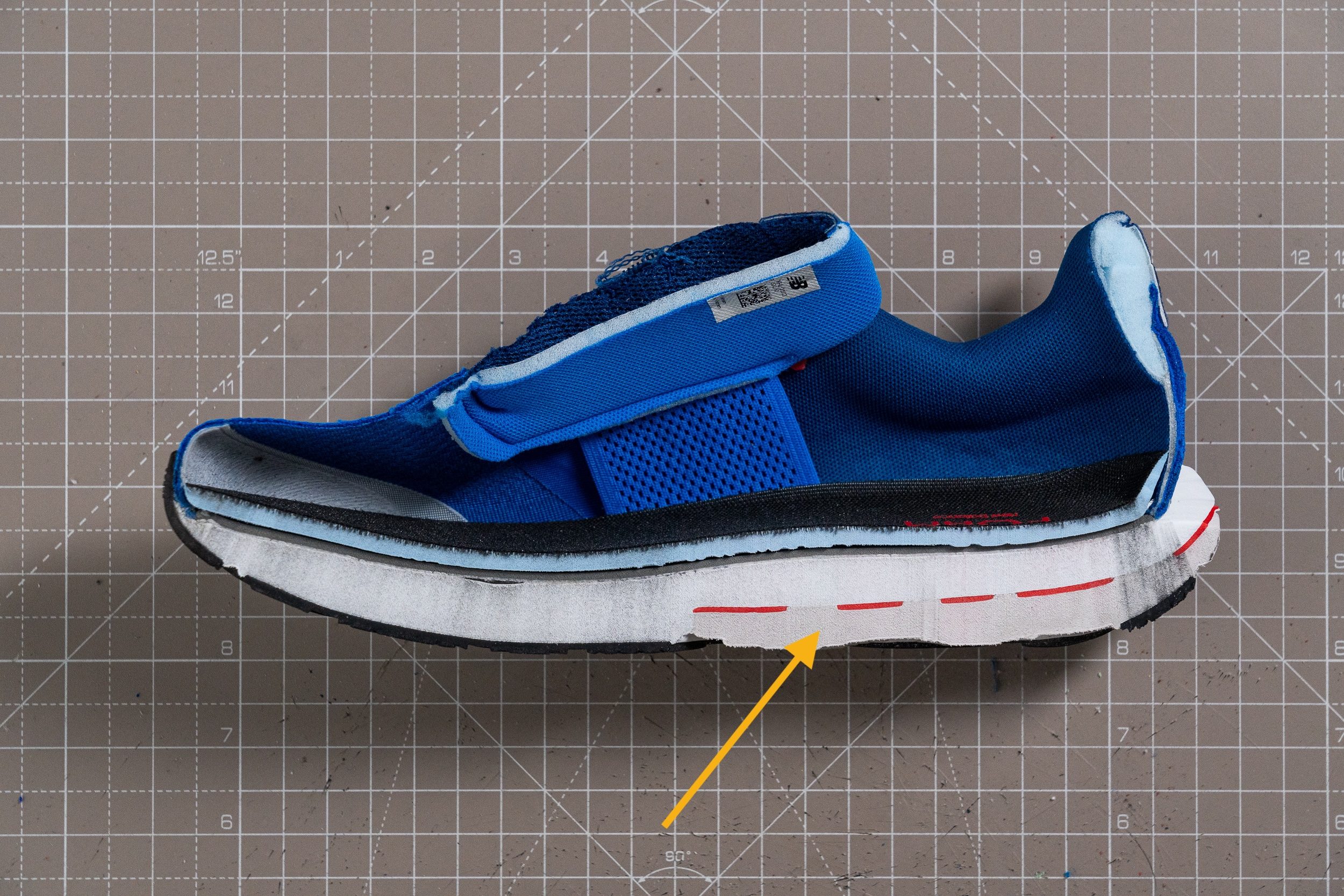
In our durometer test, this secondary layer measured 44.3 AC, almost twice the softness of the main one. This clever design offers extra support in the heel, further enhanced by a thin EVA film plate, which we’ll cover in the stability section. But hey, it’s works!
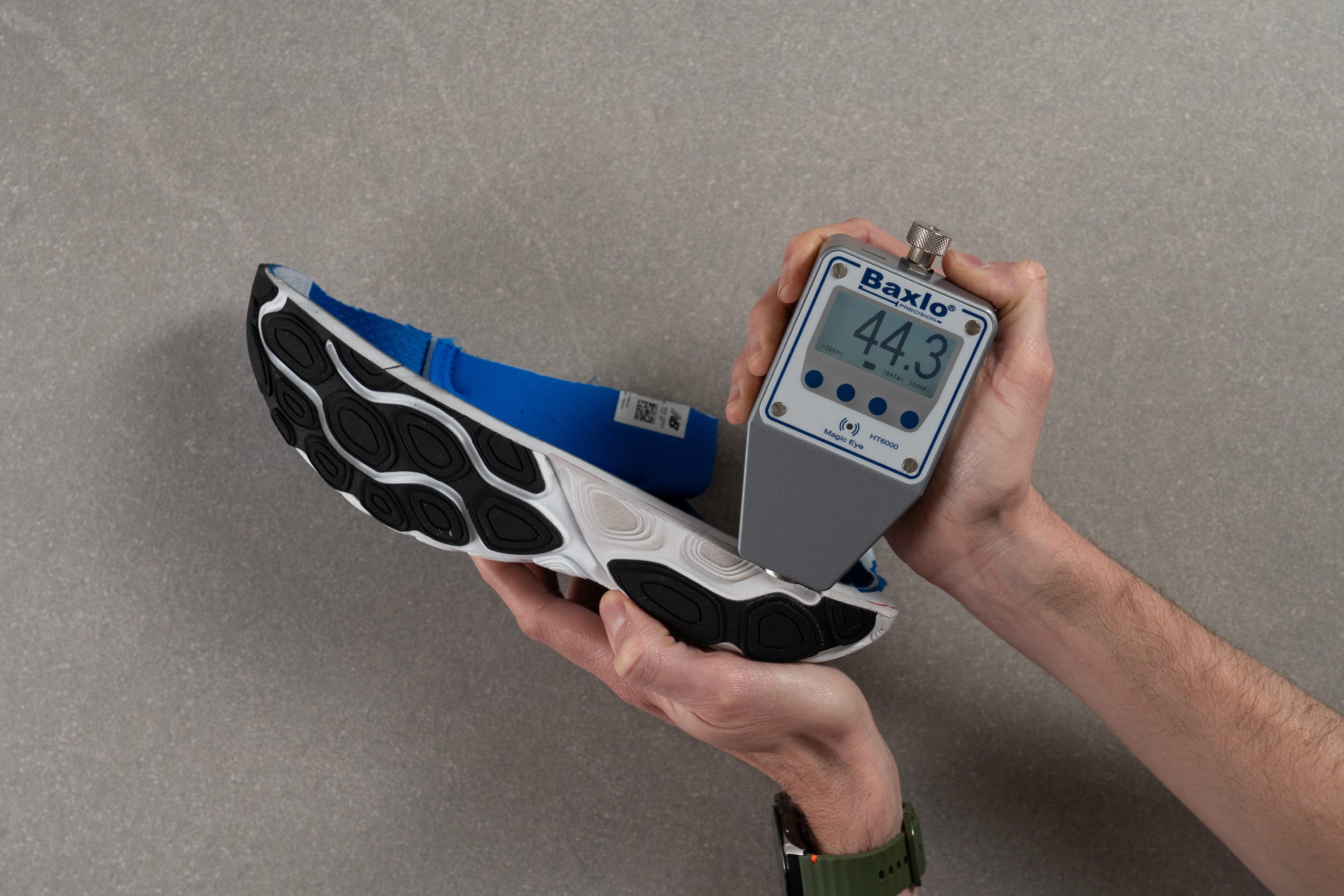
| Fresh Foam X 860 v14 | 44.3 AC |
| Average | 39.1 AC |
Size and fit
Size
New Balance Fresh Foam X 860 v14 fits slightly small (223 votes).
Internal length
| Fresh Foam X 860 v14 | 269.1 mm |
| Average | 269.4 mm |
Width / Fit
Shifting to the upper, we immediately noticed a snugger fit compared to the more relaxed feel of the neutral 880 v14—something we anticipated. The narrower design helps boost stability by creating a slight midsole flare on the sides, which is well-suited for this shoe’s purpose, making the trade-off worthwhile.
We measured the widest part at 94.4 mm with our calipers, an average width that should accommodate most feet comfortably. In classic New Balance style, the shoe is available in all 4 widths, though not every market may carry the full range.
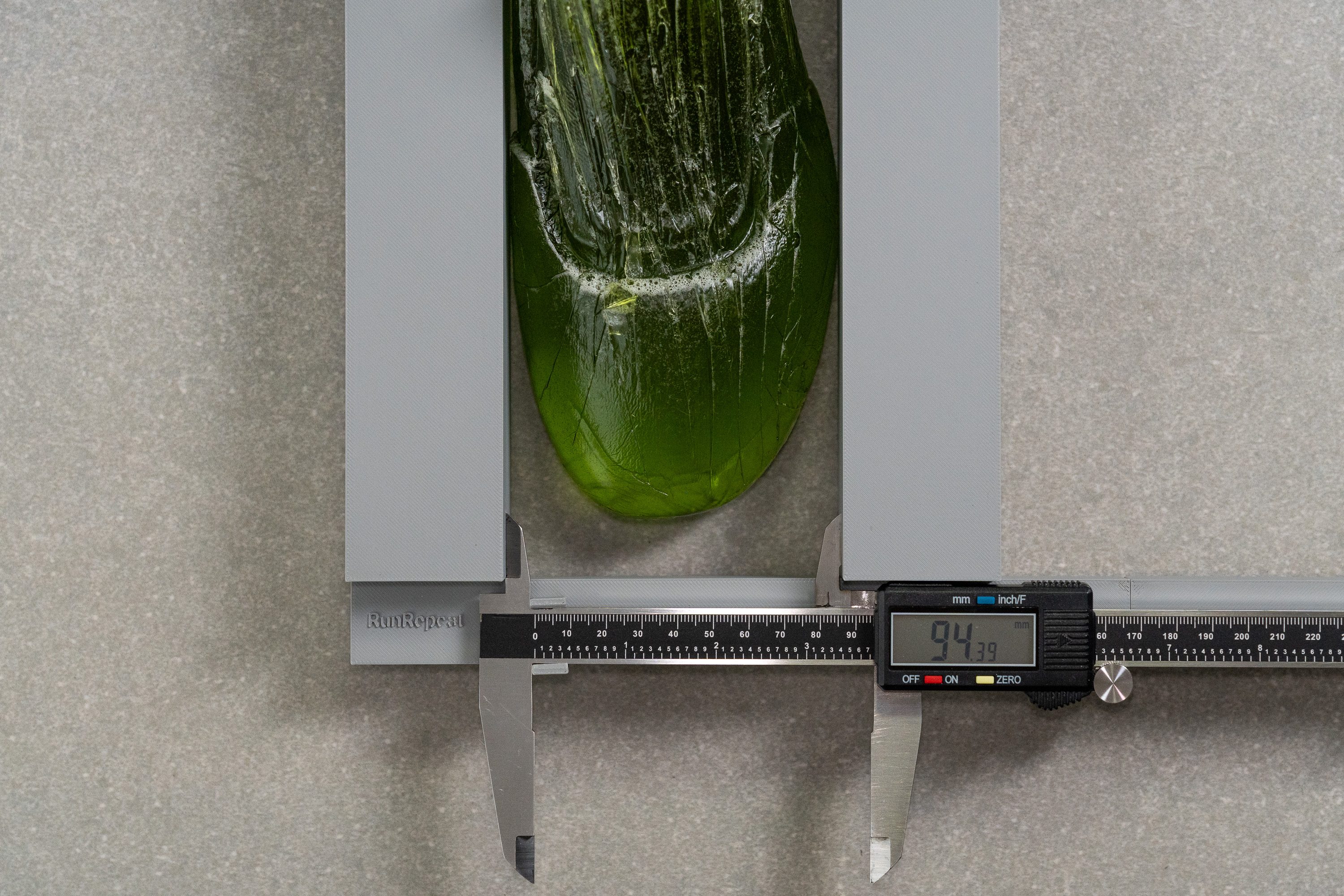
| Fresh Foam X 860 v14 | 94.4 mm |
| Average | 95.1 mm |
Toebox width
We also measured a toebox width of 73.0 mm, which aligns perfectly with our experience—it feels neither too spacious nor too snug, just average.
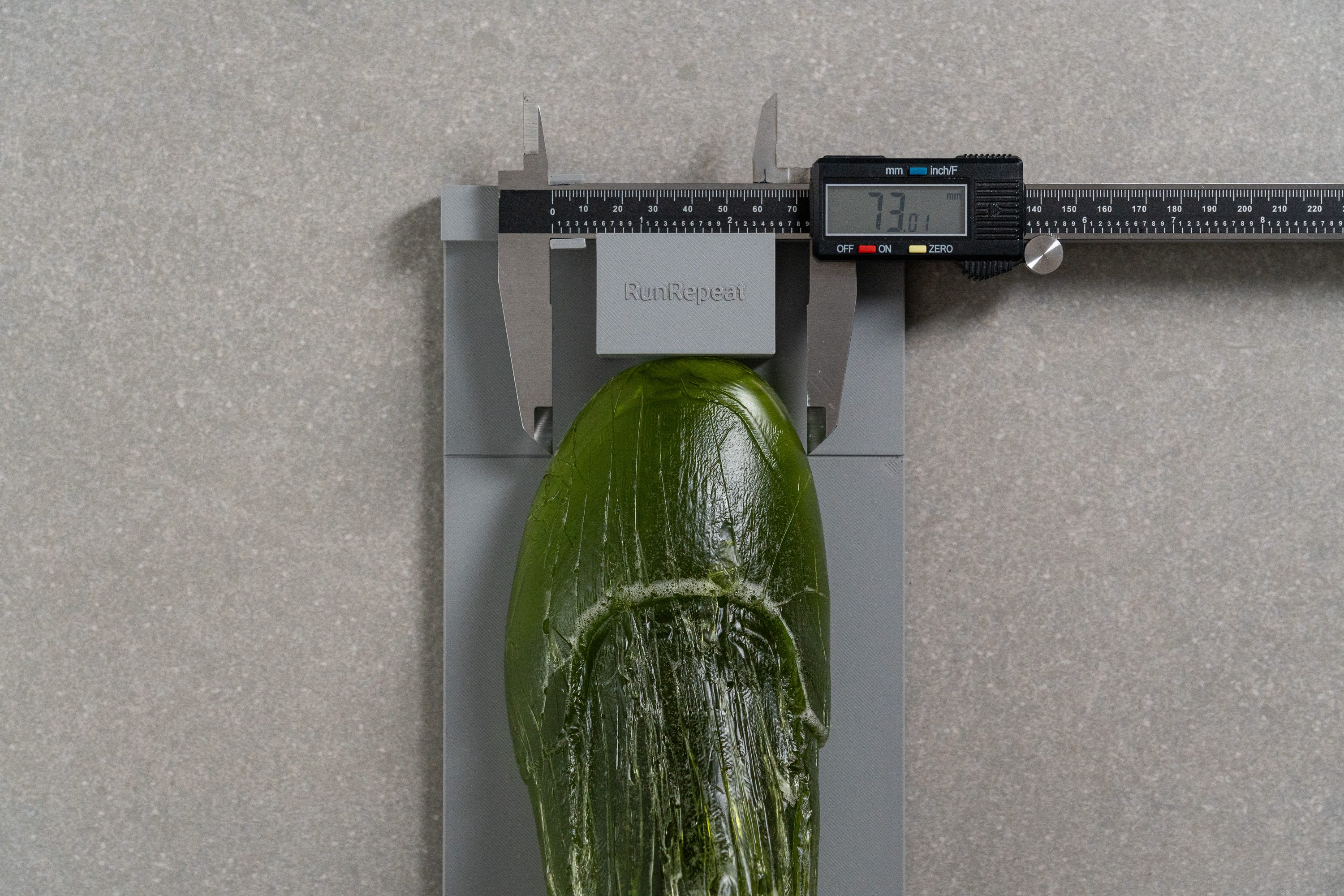
| Fresh Foam X 860 v14 | 73.0 mm |
| Average | 73.3 mm |
Toebox height
In terms of volume, we found there enough room at 28.5 mm, never feeling too tight, which we appreciated.
Recently, New Balance has tended to design uppers that sat too low, but this one offers a comfortable fit.
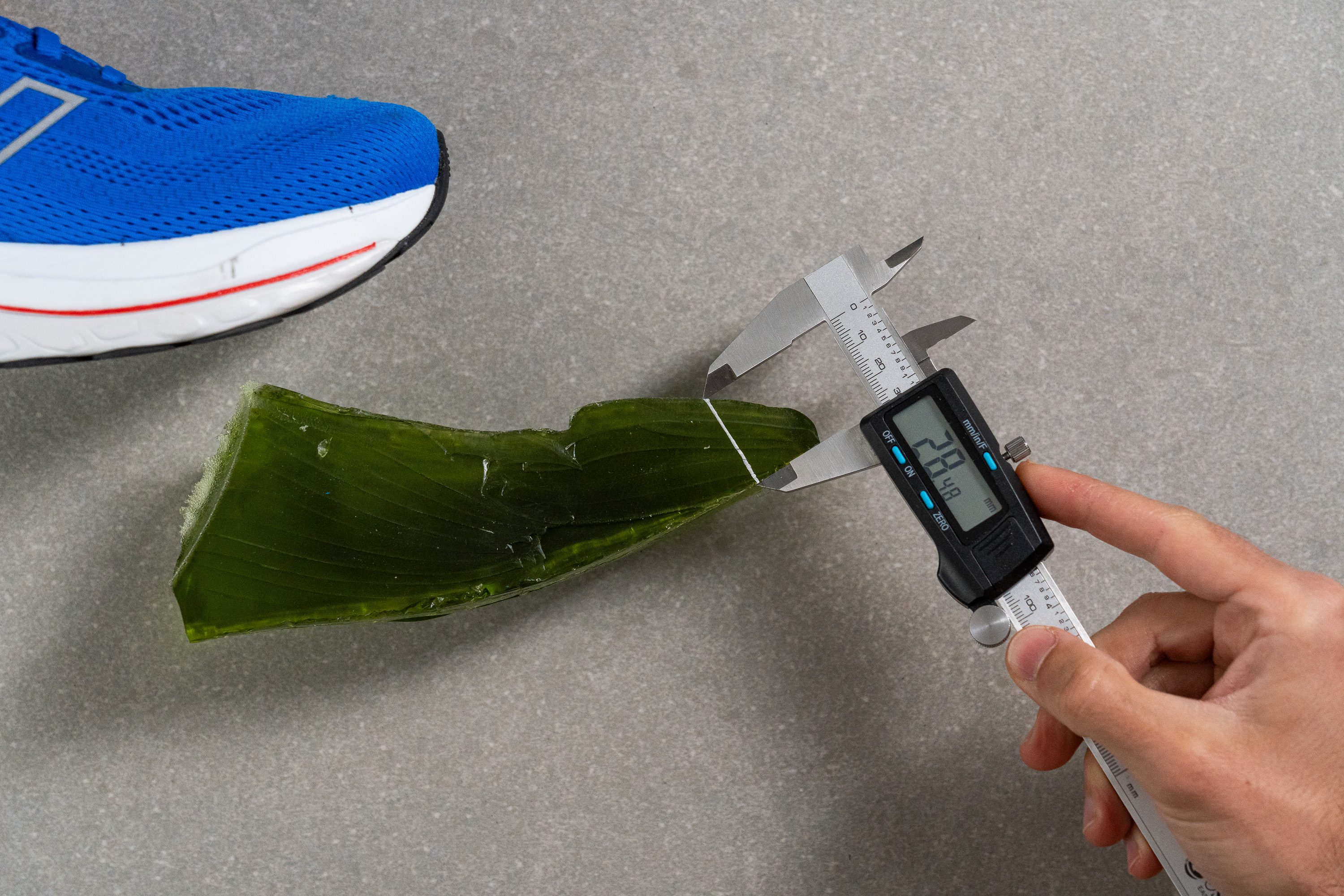
| Fresh Foam X 860 v14 | 28.5 mm |
| Average | 27.0 mm |
Traction / Grip
Traction test
The 860 v14 showed a solid friction score of 0.50 in our SATRA TM144 grip test proving to have enough grip for both dry and wet roads.
| Fresh Foam X 860 v14 | 0.50 |
| Average | 0.49 |
Outsole design
In lieu of a full-length outsole, the shoe features enough rubber to cover up the strategic forefoot area where slipping is most likely to occur during the push-off. But if you care about full-length outsole coverage, the 860 v14 leaves quite a bit of foam exposed in the midfoot and heel.
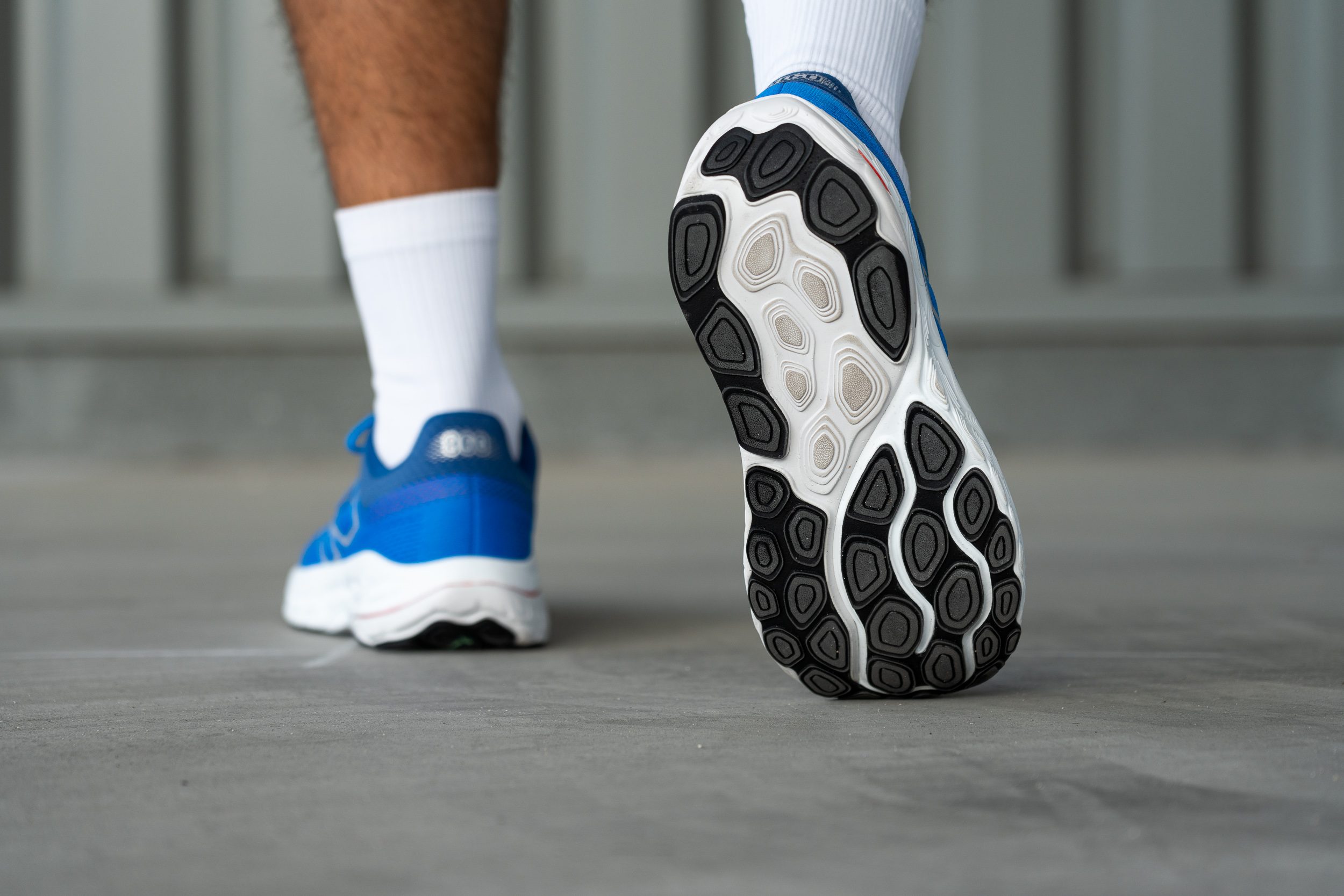
Flexibility / Stiffness
In our 30-degree bend test, we measured an average 14.6N, which is quite like many popular neutral daily trainers! This makes the 860 v14 a good choice for those seeking a versatile shoe with a wide range of activities in mind, not just running.
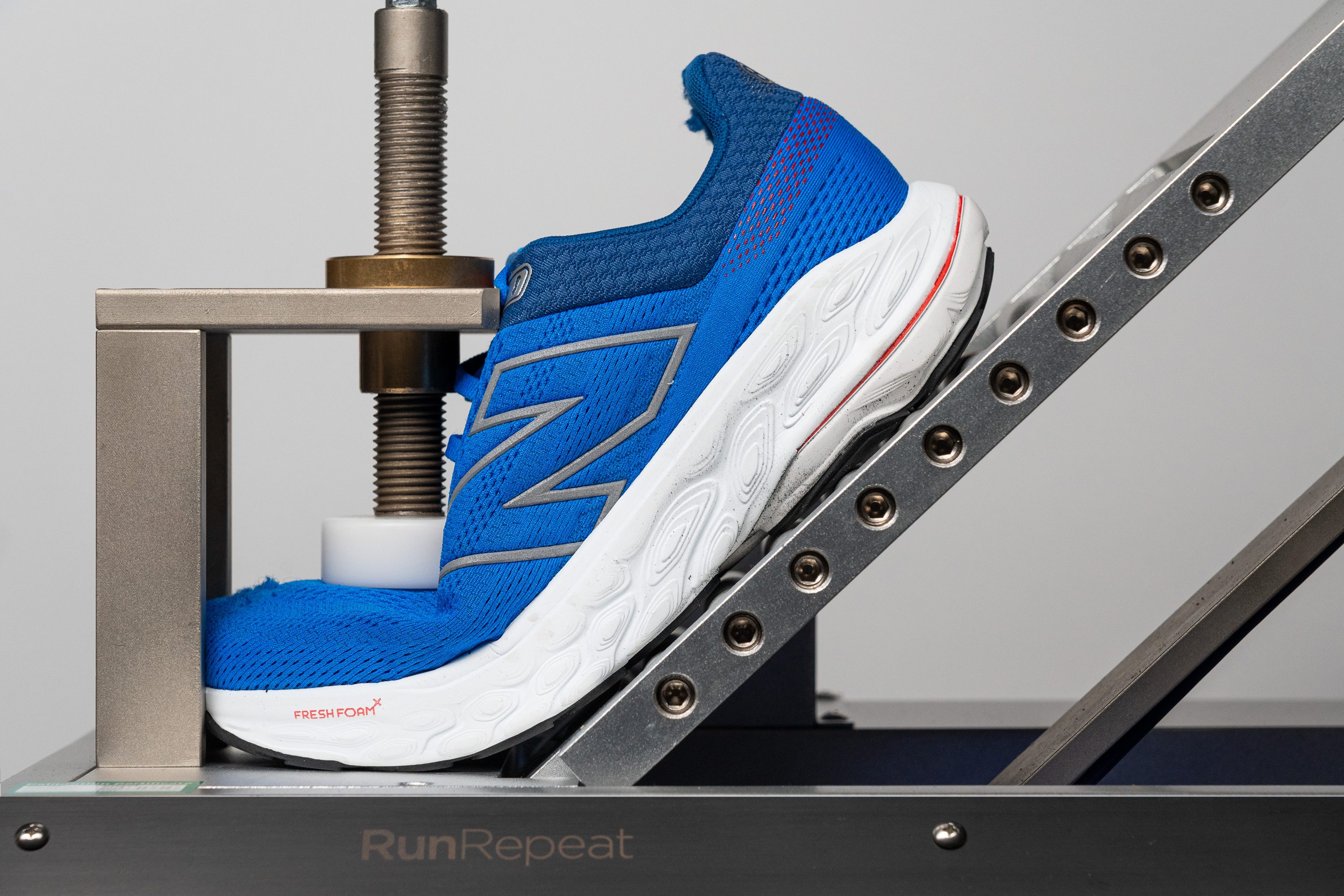
| Fresh Foam X 860 v14 | 14.6N |
| Average | 15.3N |
Weight
Recent New Balance daily trainers like the Fresh Foam X 1080 v13 impressed us with their lightweight build, but that’s not the case for the Fresh Foam X 860 v14. While not heavy, its 10.4 oz (295g) result is just decent.
We believe the added weight comes from two main factors—the 860 v14 includes a bigger midsole, and it features greater rubber coverage to handle the wear pronators often cause in the outsole.
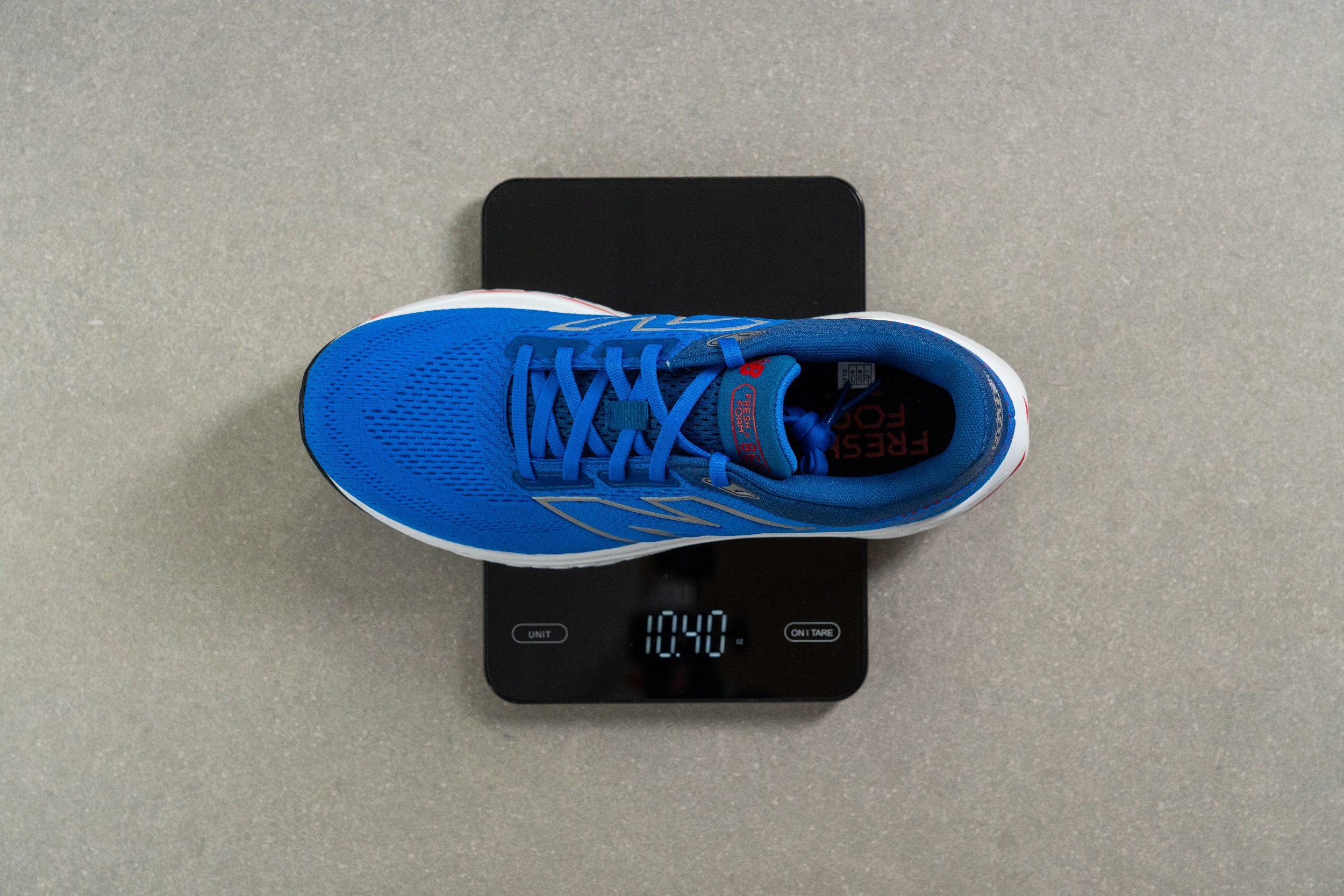
| Fresh Foam X 860 v14 | 10.4 oz (295g) |
| Average | 9.3 oz (264g) |
Breathability
The engineered mesh upper of the 860 is a simple design, free of thermoplastic or added elements that could obstruct airflow. However, ventilation was still not the best—earning a 3/5 rating.
We found that New Balance prioritized comfort and stability over breathability, which somehow makes sense for a shoe like this. When held up to the light, it's clear that not much air passes through, especially in the midfoot area.
Our microscope revealed the standard dual-layer engineered mesh found in many other running shoes.
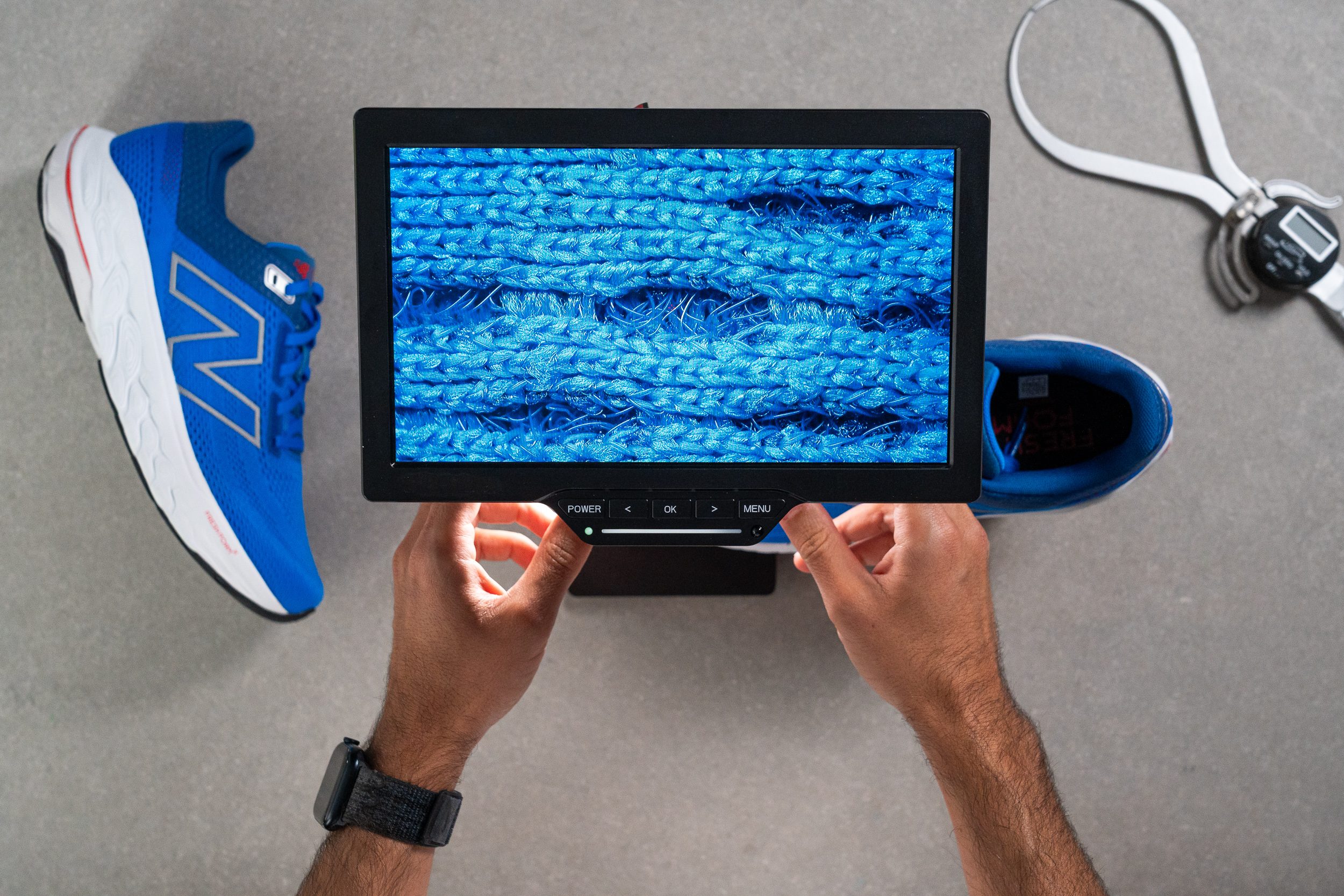
While this setup enhances comfort, it unfortunately blocks ventilation. For future models, we think that New Balance needs to perforate the secondary layer to improve airflow.
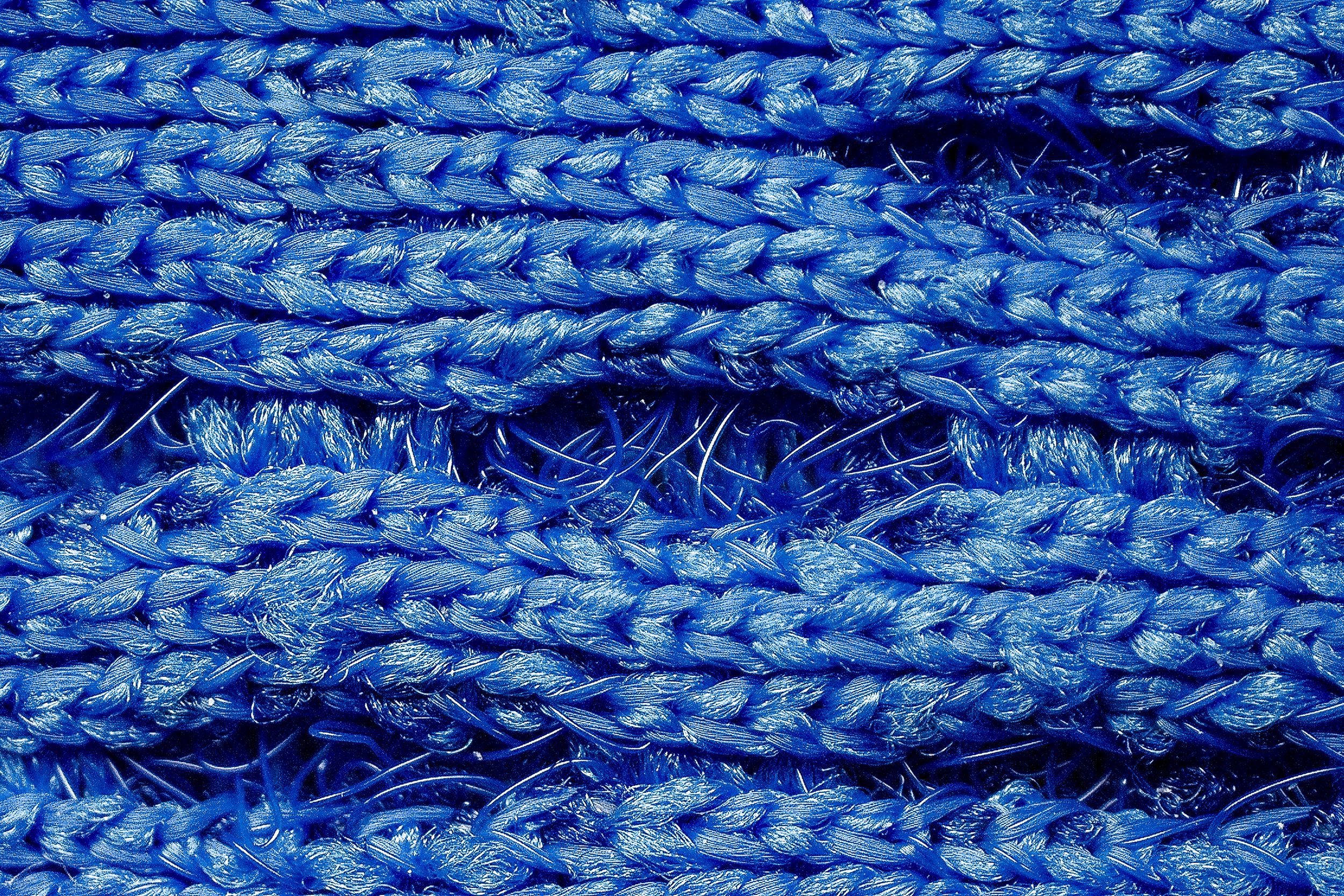
The upper's slight stretch is great for a flexible fit, allowing toe better movement, and the substantial heel padding helps offset the high stiffness of the rigid counter.
| Fresh Foam X 860 v14 | 3 |
| Average | 3.7 |
Stability
Lateral stability test
Let’s dive into stability, as it's the most crucial aspect of this shoe. The 860 v14 takes inspiration from the latest Vongo, using an EVA plate that doesn’t add stiffness but helps balance out the softer layer of Fresh Foam X.
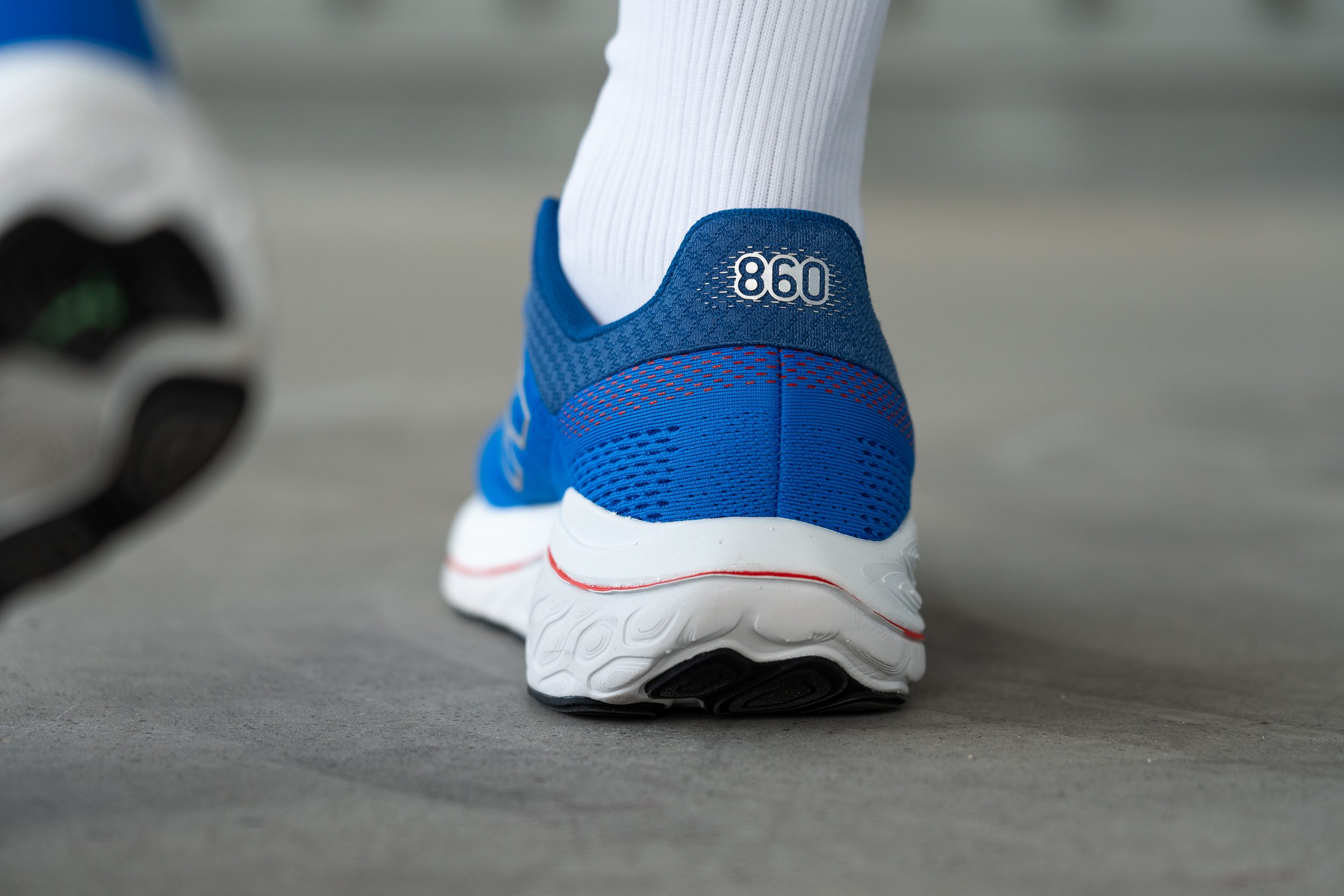
To enhance stability and push you outwards, New Balance incorporates a broader midfoot area plus a wedge design, where the outer side is firmer due to a larger portion of the secondary foam. This creates a steady feel, ideal for runners with moderate or slightly higher pronation. It’s a traditional stability method, thoughtfully adapted to today’s needs.
Torsional rigidity
For a mild-stability running shoe, the Fresh Foam X 860 v14 is surprisingly flexible, earning a 3/5 in our assessment. This is great for comfort, and honestly, we believe adding more stiffness wasn’t necessary at all.
| Fresh Foam X 860 v14 | 3 |
| Average | 3.5 |
Heel counter stiffness
We found that New Balance slightly stiffened the heel counter compared to its daily trainers, scoring a 4/5 on our scale. In our experience, this added firmness aligns well with the 860 line's stability focus, especially for rearfoot strikers.
| Fresh Foam X 860 v14 | 4 |
| Average | 2.9 |
Midsole width - forefoot
When we first held the shoe after receiving it from our New Balance online purchase, it was clear this wasn’t one of those bulky stability giants like the Hoka Gaviota 5—it felt much sleeker and more streamlined.
In terms of dimensions, it's more like a standard running shoe, with a forefoot width of 113.6 mm.
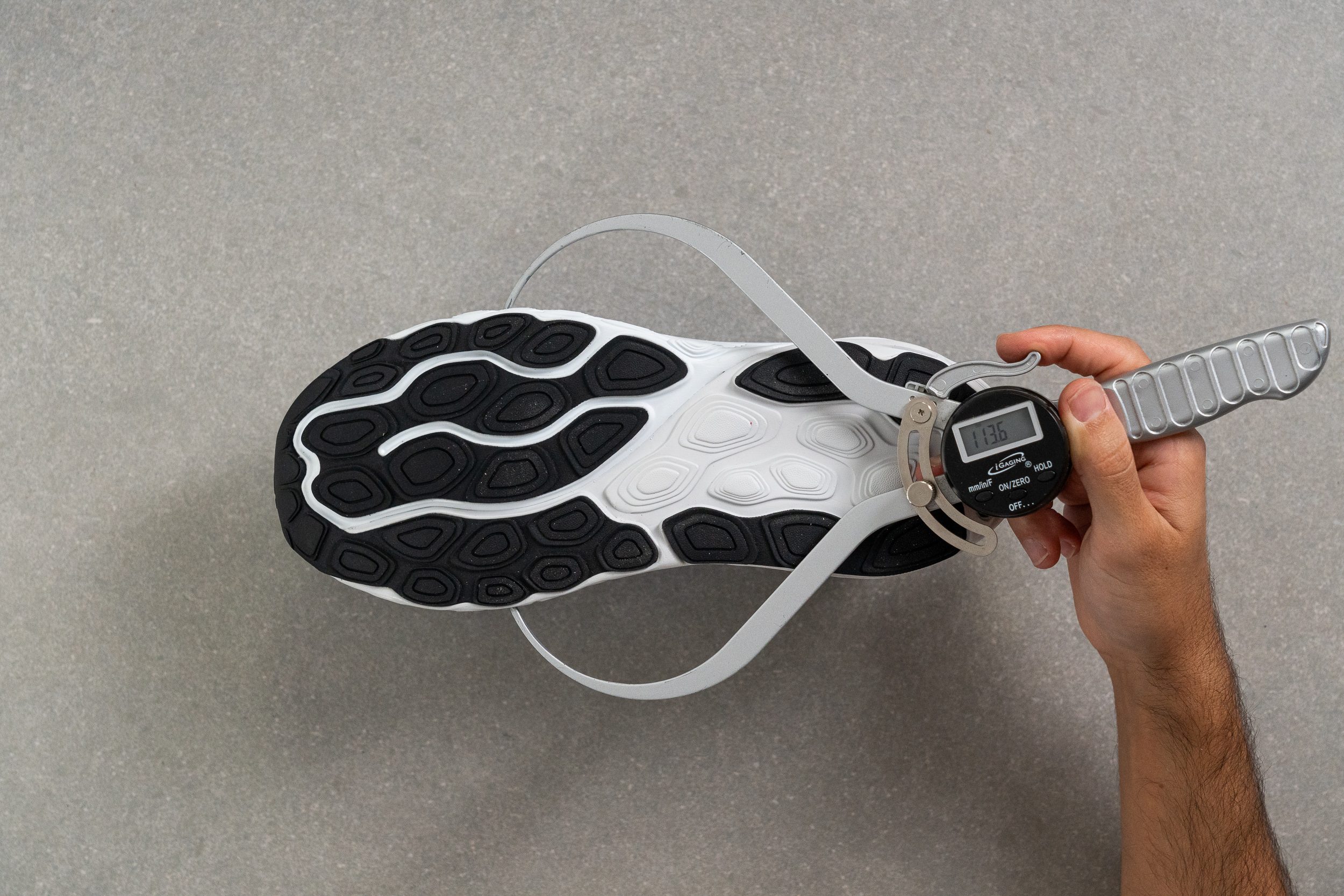
| Fresh Foam X 860 v14 | 113.6 mm |
| Average | 114.4 mm |
Midsole width - heel
There’s a small but important change from the 880 that we noticed here in the 860—our calipers revealed the heel has been widened to enhance support in this area. And this is crucial since many runners with moderate stability needs are rearfoot strikers.
Our second measurement confirmed this with a 93.6 mm result.
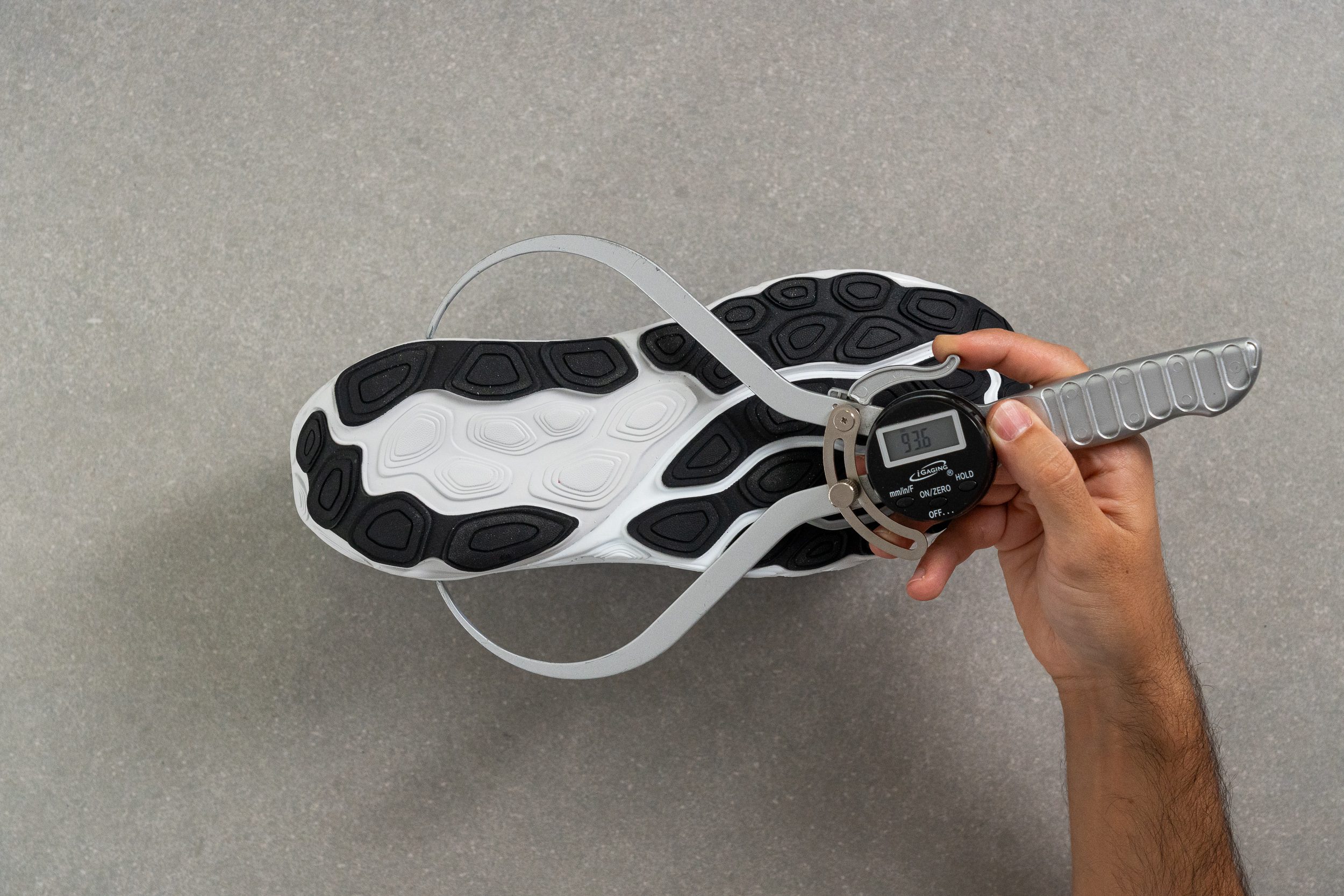
| Fresh Foam X 860 v14 | 93.6 mm |
| Average | 90.6 mm |
Plate
What makes the 860 stand out from most competitors is New Balance's unique approach to stability, using a combination of two foams and an EVA Film plate. This plate isn’t ordinary—it runs full length in the heel but only covers the inner side of the midfoot and forefoot to counterbalance pronation forces. Check it out!
But, what exactly is EVA Film? Well, it's a super-flexible plate made from compressed foam that adds almost no stiffness but helps keep the foot centered.
Unlike nylon or carbon plates that enhance both stability and running economy but add torsional rigidity, the EVA Film in this shoe focuses on support and comfort.
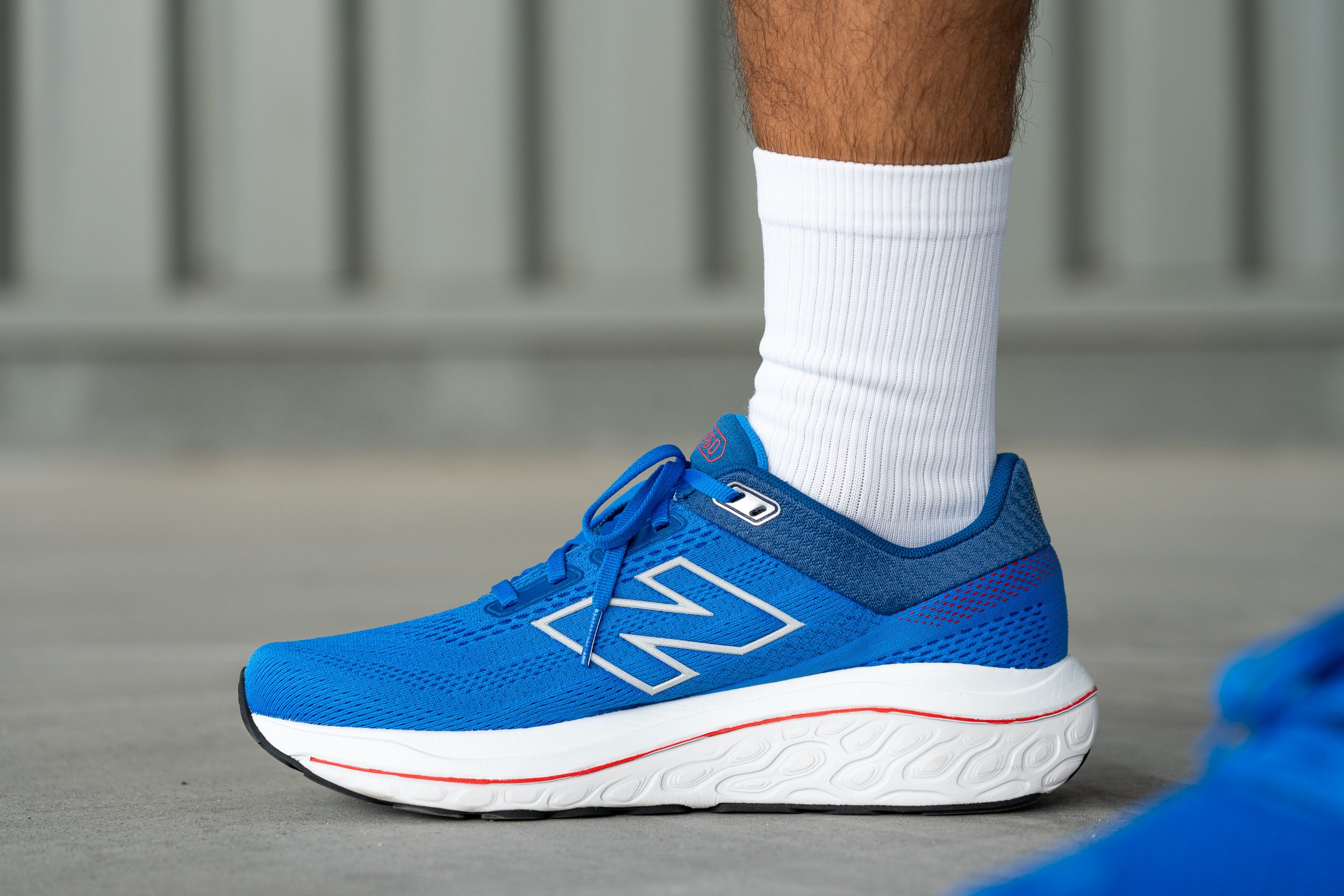
Durability
Toebox durability
Starting with its less-than-stellar breathability, we were eager to test if the lack of airflow would at least deliver the durability we expect from a dependable trainer.
Unfortunately, that wasn’t the case. After using the Dremel, we discovered a significant hole—leading us to rate its performance at a disappointing 2/5. There's definitely a lot of room for improvement in this area.
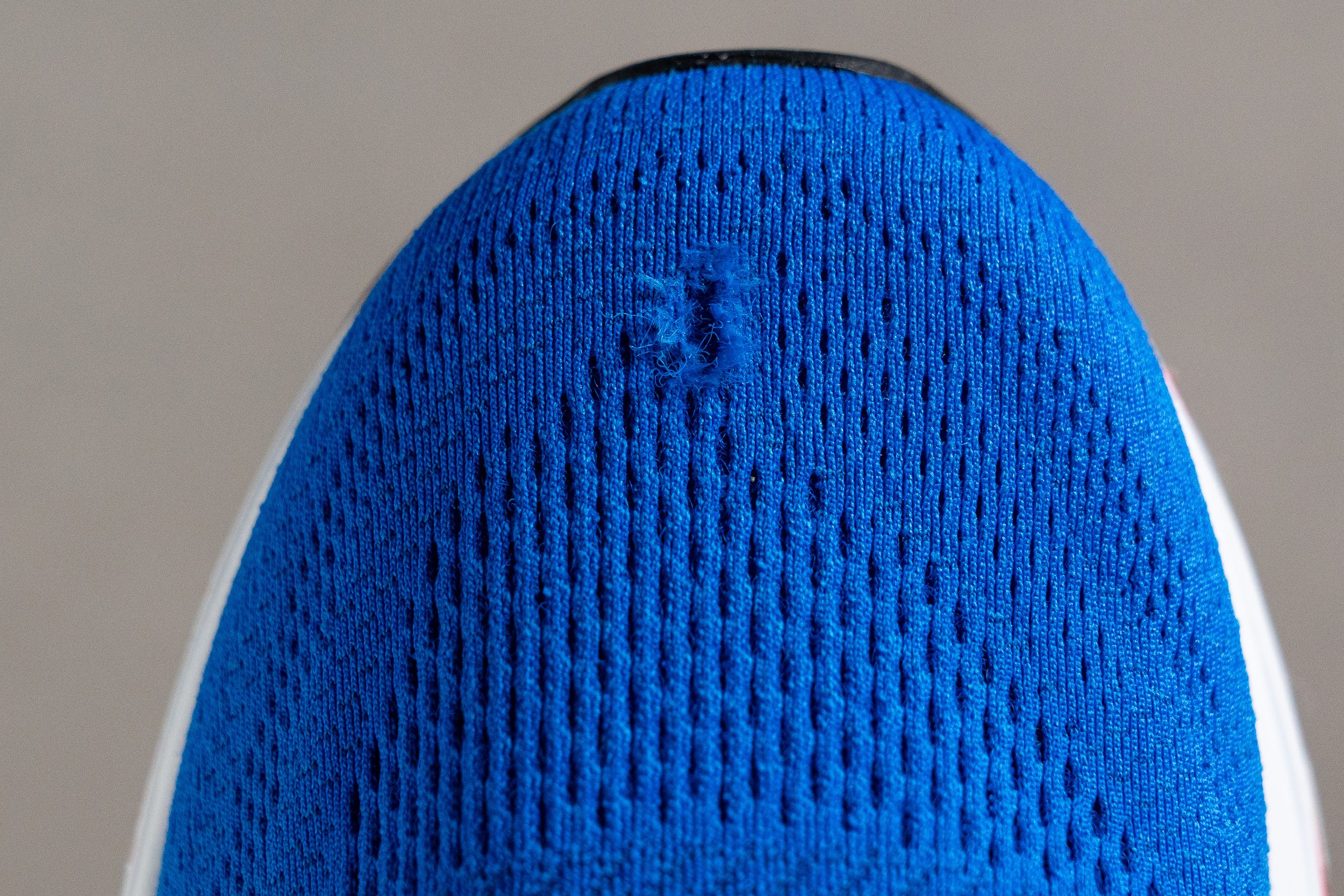
| Fresh Foam X 860 v14 | 2 |
| Average | 2.6 |
Heel padding durability
The drama didn’t end there—the heel counter showed one of the worst performances we’ve seen in the lab recently.
If the toebox earned a 2, this time we had to give the lowest possible score. We found the heel padding deserving of a dismal 1/5—something that should definitely put New Balance on alert!
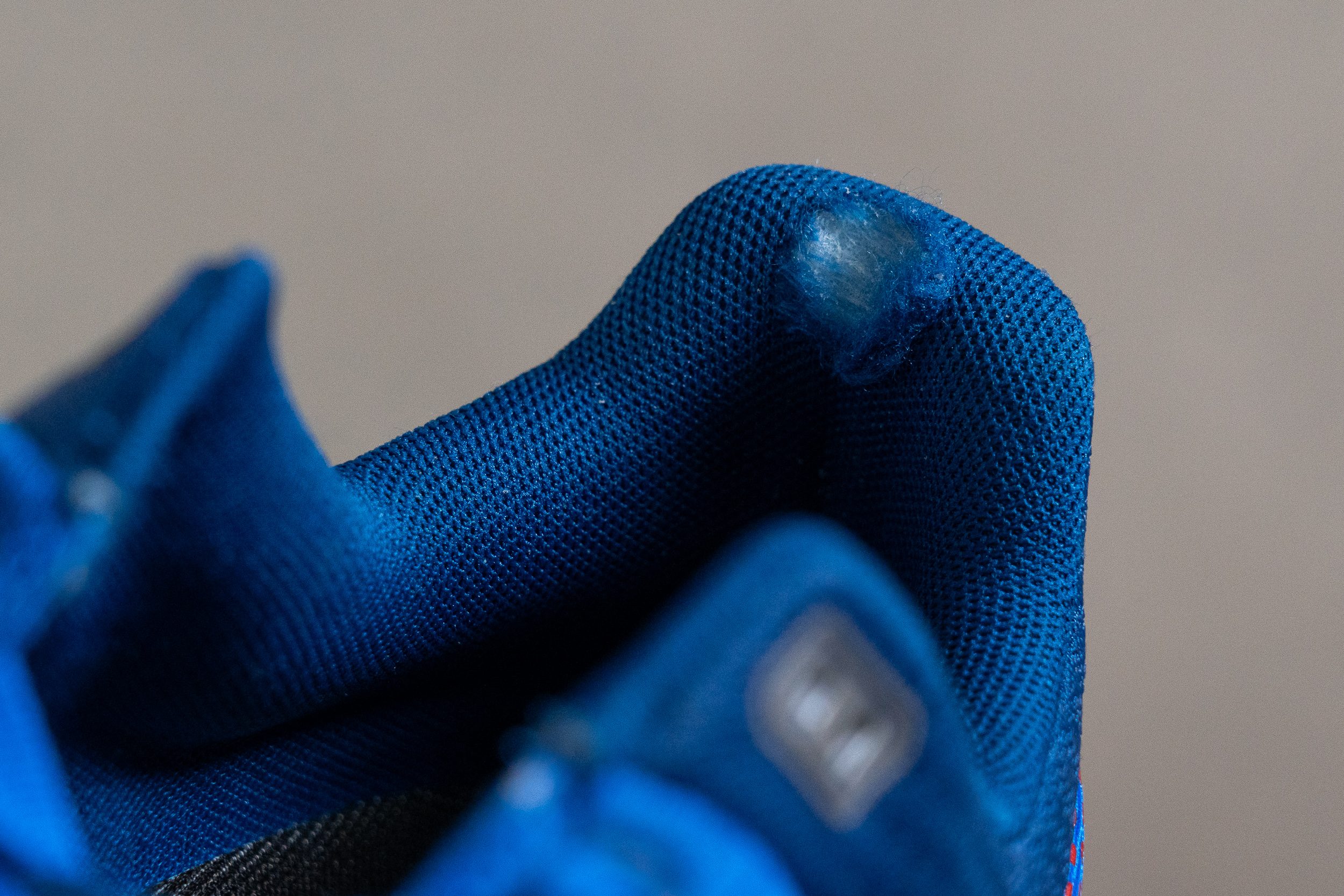
| Fresh Foam X 860 v14 | 1 |
| Average | 3.4 |
Outsole durability
So we fired up the Dremel for the final time. The result? We measured a wear depth of 1.2 mm, which we think is an decent outcome.
While this measurement isn’t alarming, it left us slightly underwhelmed. All in all, we expected a bit more from this foam regarding durability. This photo clearly highlights that the exposed midsole is minimal, with the white pods also covered in rubber.
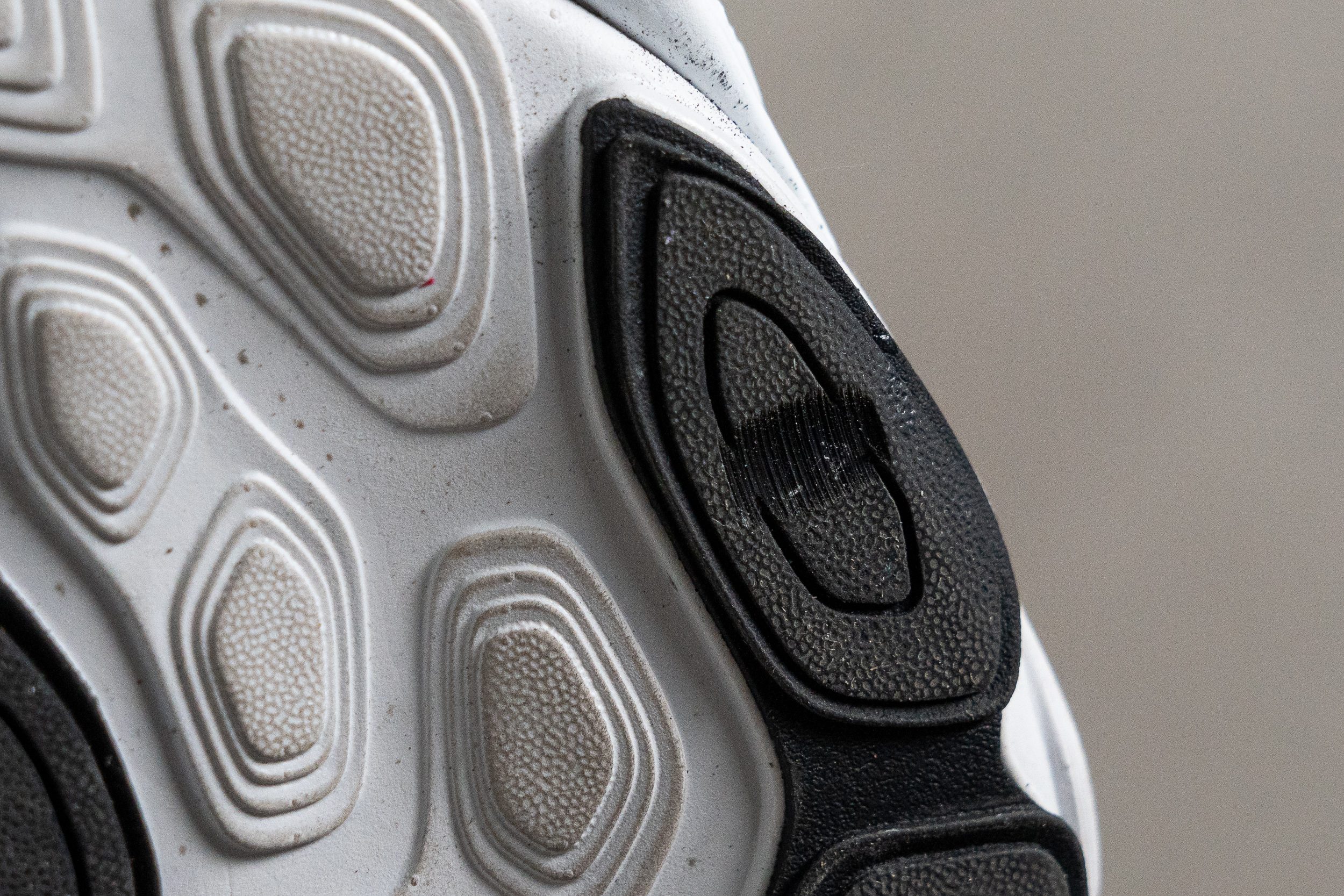
| Fresh Foam X 860 v14 | 1.2 mm |
| Average | 1.1 mm |
Outsole thickness
We measured the outsole thickness and found it to be 3.5 mm—a generous layer of rubber. However, this also explains why the ride feels a bit muted during runs.
In our view, this thickness compensates somewhat for the average durability we discovered earlier.
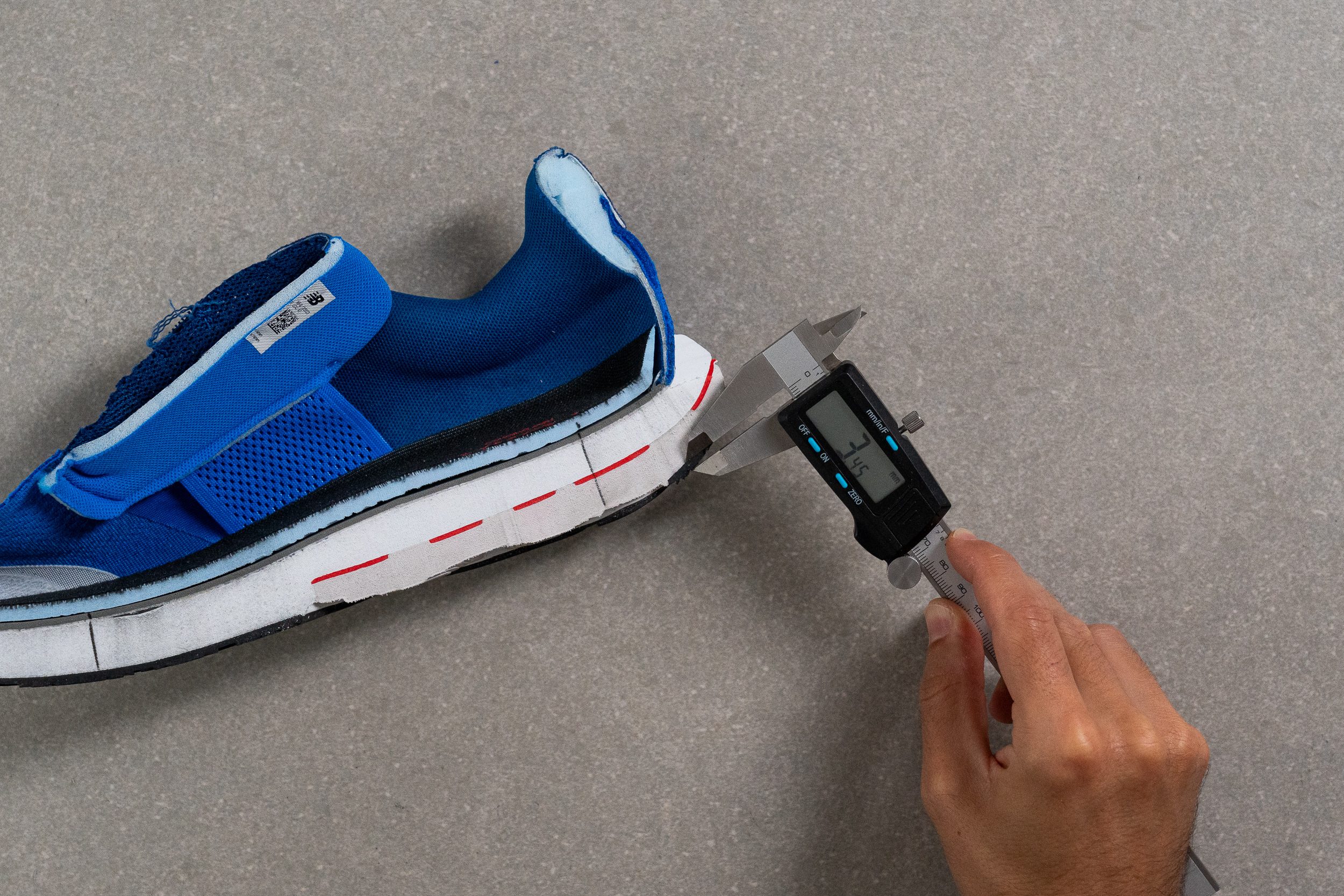
| Fresh Foam X 860 v14 | 3.5 mm |
| Average | 3.2 mm |
Misc
Insole thickness
Inside the shoe, we found a comfortable EVA insole, measuring 4.8 mm in thickness. In our experience, this footbed aligns well with what we expect from an average daily trainer.
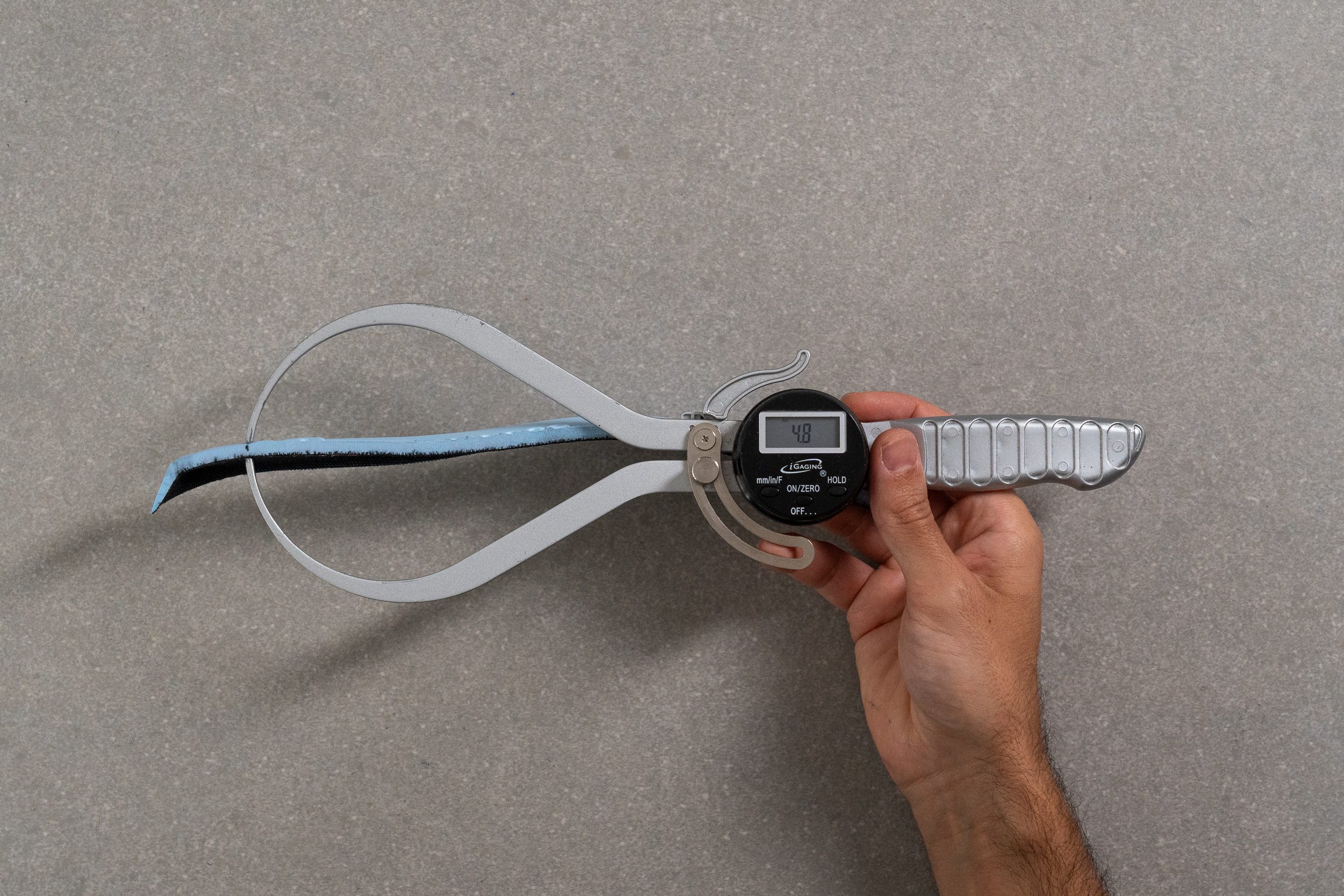
| Fresh Foam X 860 v14 | 4.8 mm |
| Average | 4.5 mm |
Removable insole
We easily removed the insole, so if you want to swap it for another one that adds even more support, it's not a problem at all.
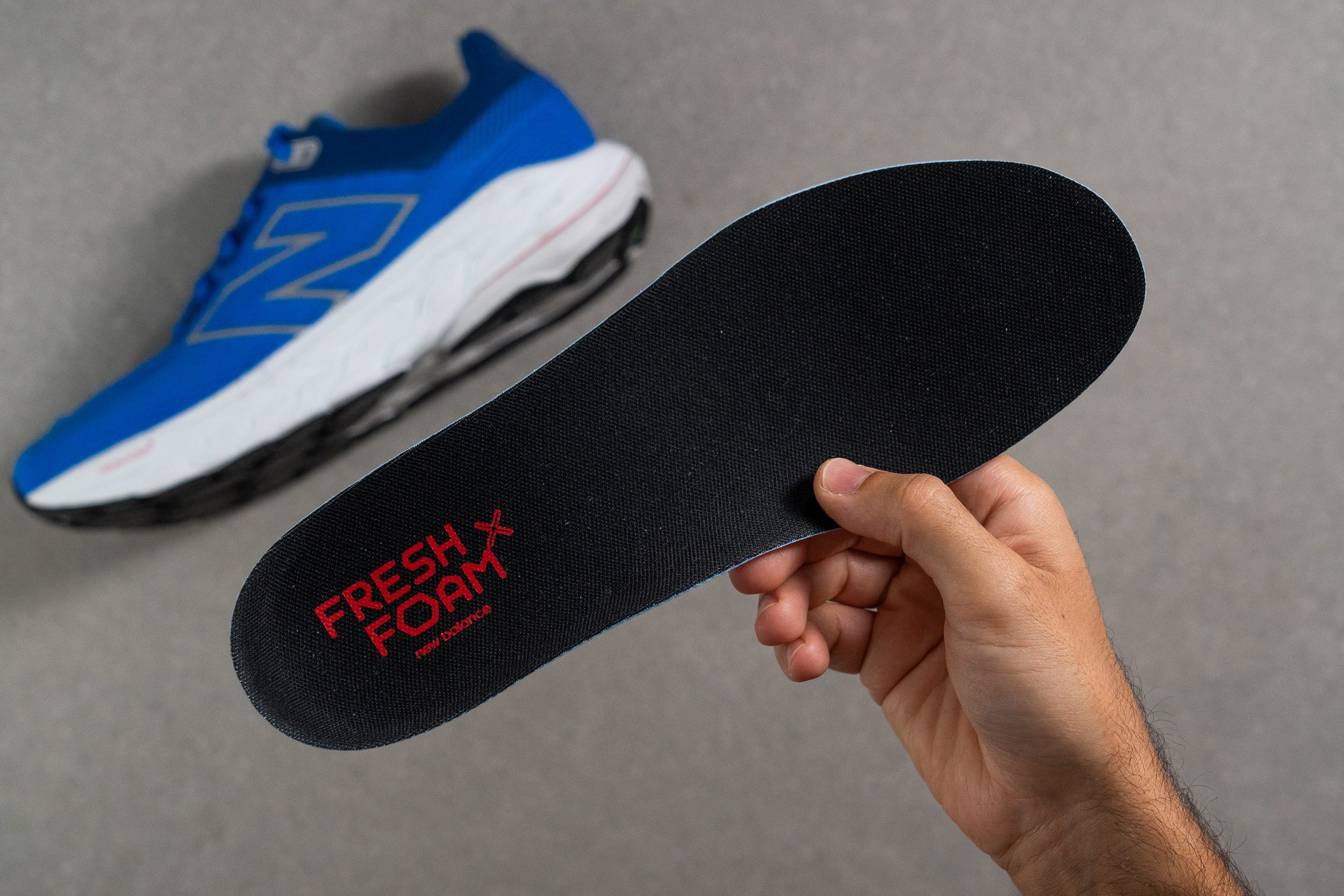
| Fresh Foam X 860 v14 | Yes |
Midsole softness in cold (%)
Since Fresh Foam X is EVA-based, we weren't surprised when the midsole firmed up by 54.1% in our second durometer test after 20 minutes in the freezer. Disappointing, yes—but definitely expected.
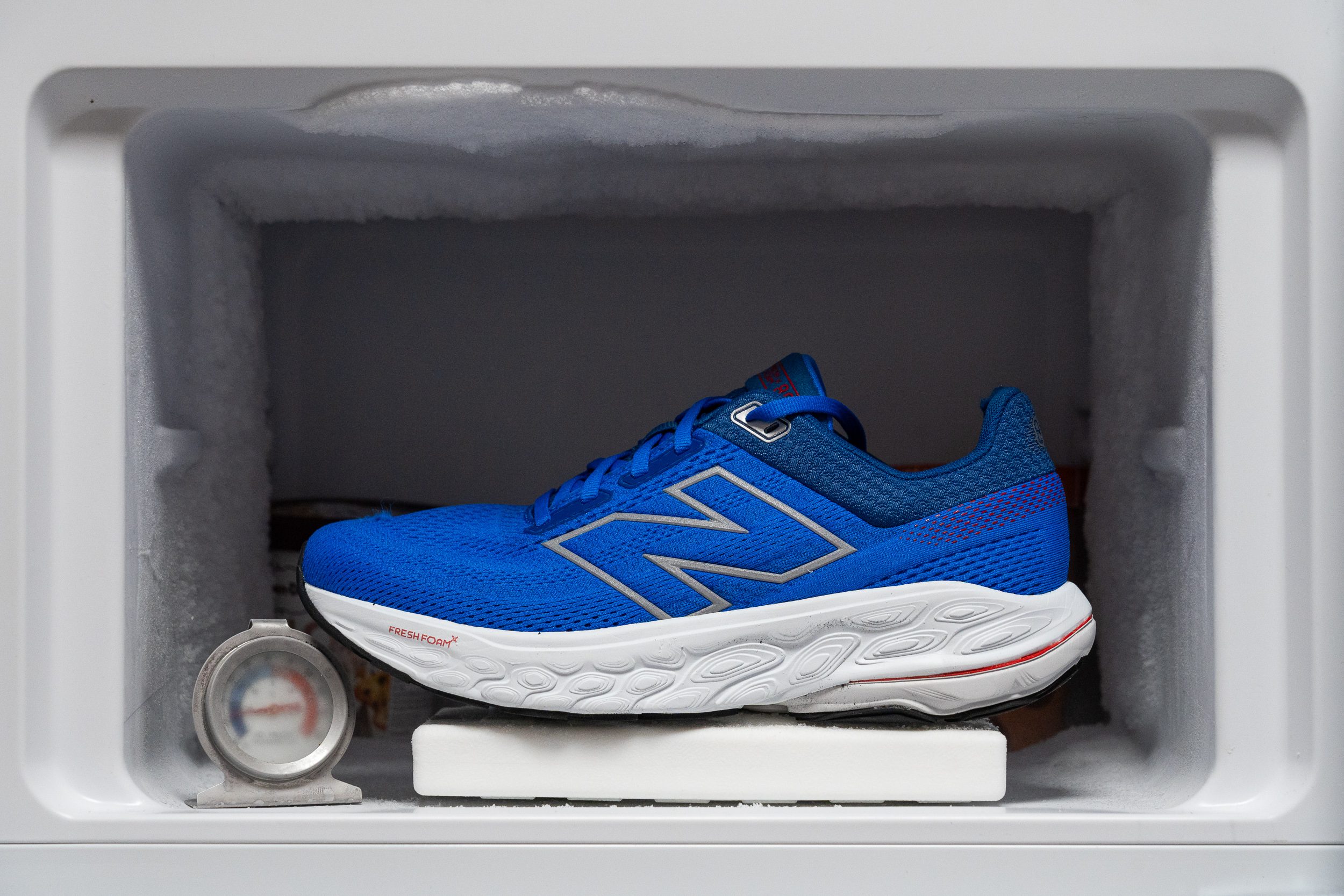
| Fresh Foam X 860 v14 | 54% |
| Average | 24% |
Reflective elements
We were pleasantly surprised to discover that the big N logo on the New Balance 860 v14 is reflective—a feature we didn’t find on its neutral sibling, the 880 v14. In our view, reflective details are an essential safety addition in daily trainers, especially for evening runners!
| Fresh Foam X 860 v14 | Yes |
Tongue padding
The tongue is a winner. At 6.7 mm thick, it falls perfectly within our preferred range, offering just the right amount of cushion for the instep without feeling too bulky.
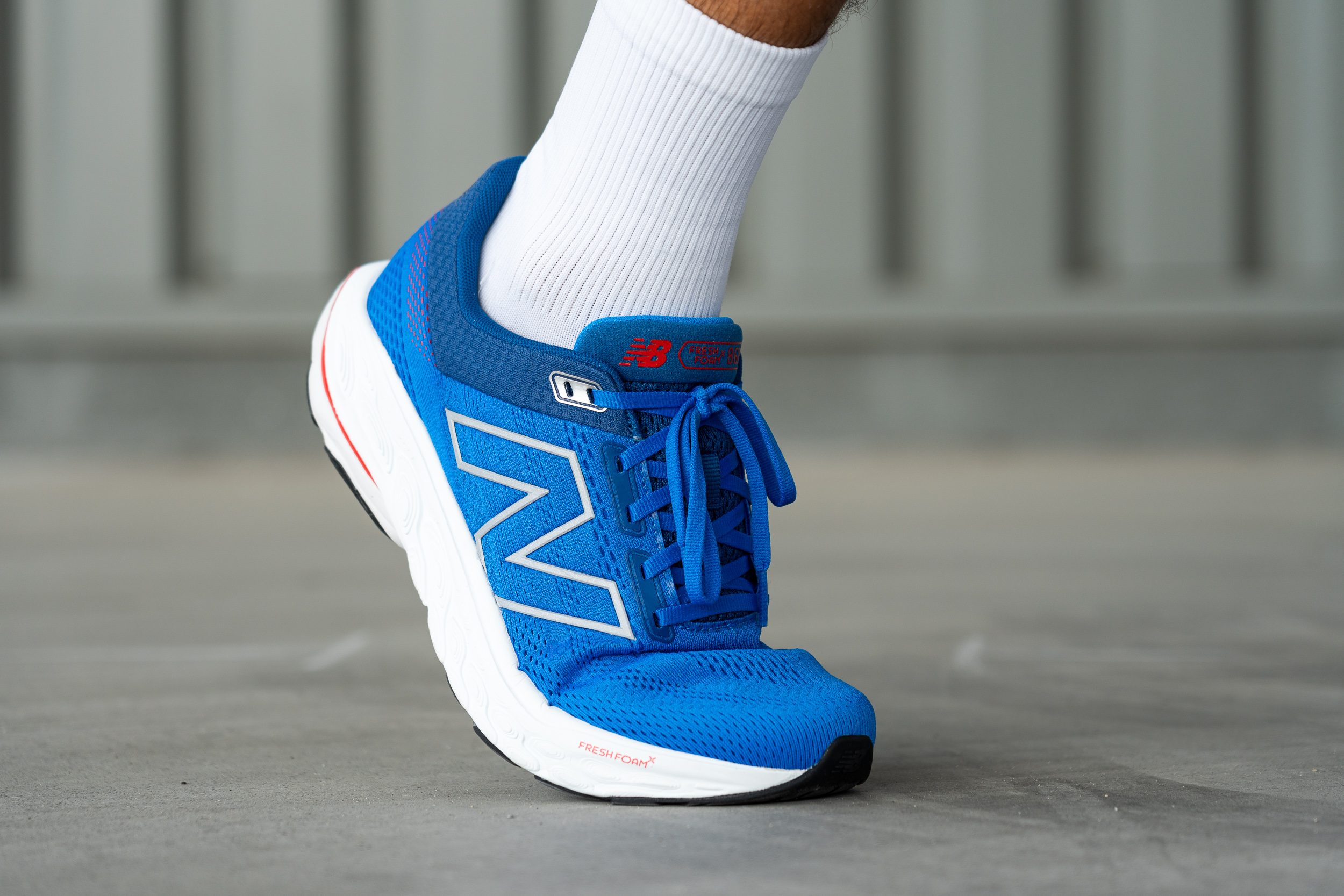
We were also happy with the lacing system. It features flat laces, punched eyelets, and the option to tie a variety of knots with the extra hole. Plus, the tongue loop adds an extra layer of security. It's simple, yet effective.
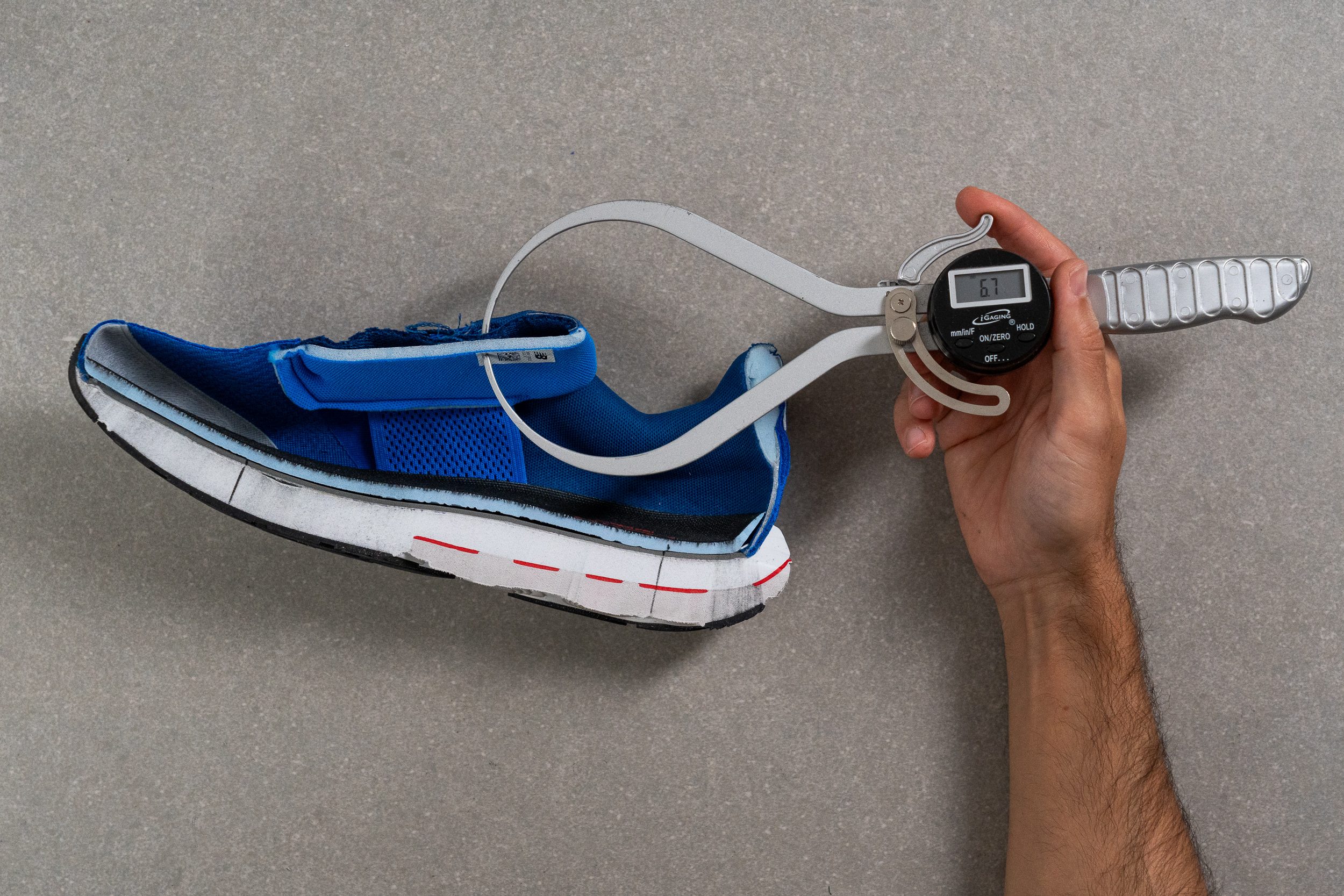
| Fresh Foam X 860 v14 | 6.7 mm |
| Average | 5.7 mm |
Tongue: gusset type
We discovered a great semi-gusseted tongue made from perforated fabric—a thoughtful addition, as many brands often use non-ventilated materials that go unnoticed. This part of the shoe rarely gets attention, but we always make sure to evaluate it.
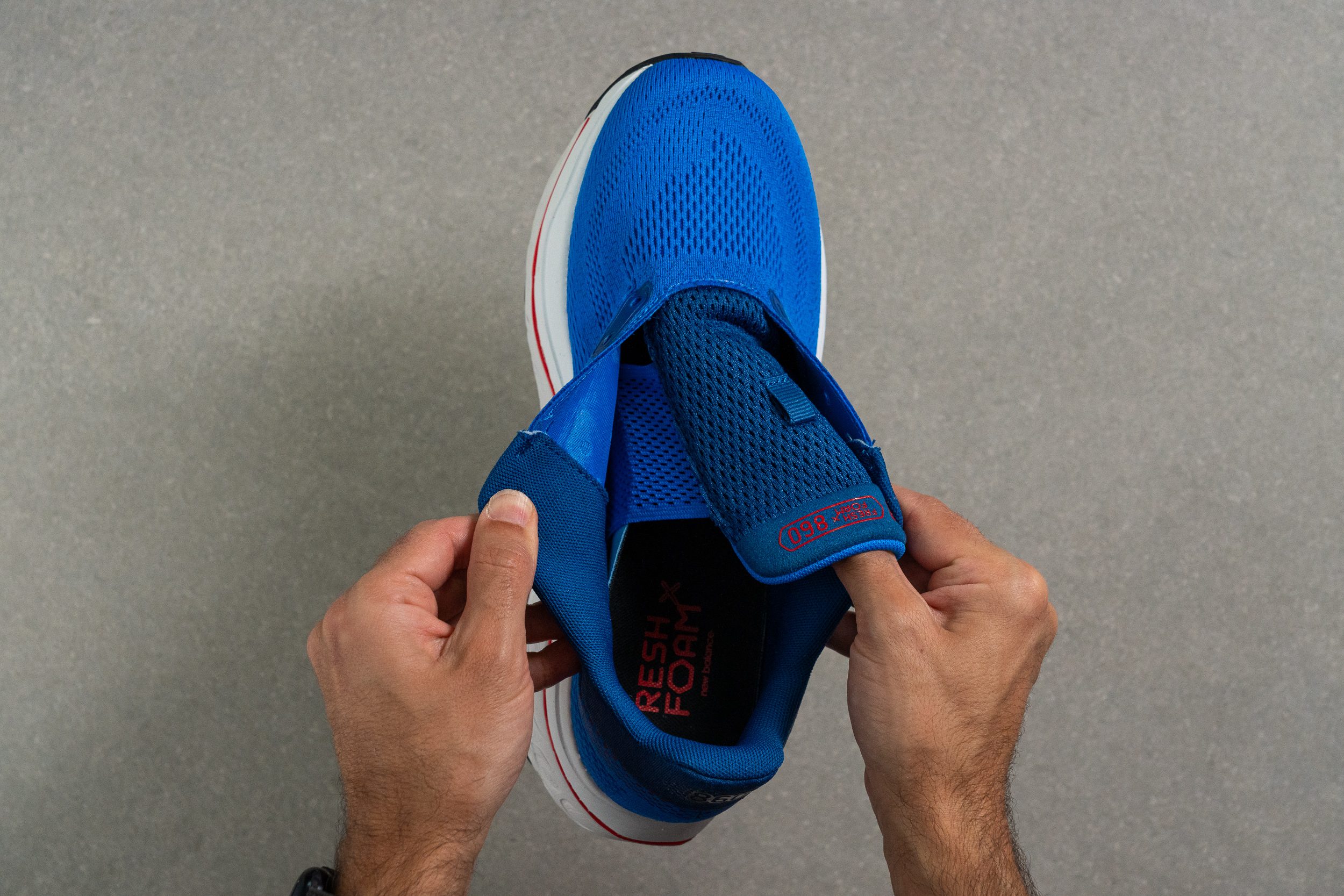
| Fresh Foam X 860 v14 | Both sides (semi) |
Heel tab
In keeping with most Fresh Foam X designs from the road lineup—trail models differ—New Balance skipped the heel tab and instead added the 860 logo, ensuring everyone knows which model you're sporting out there.
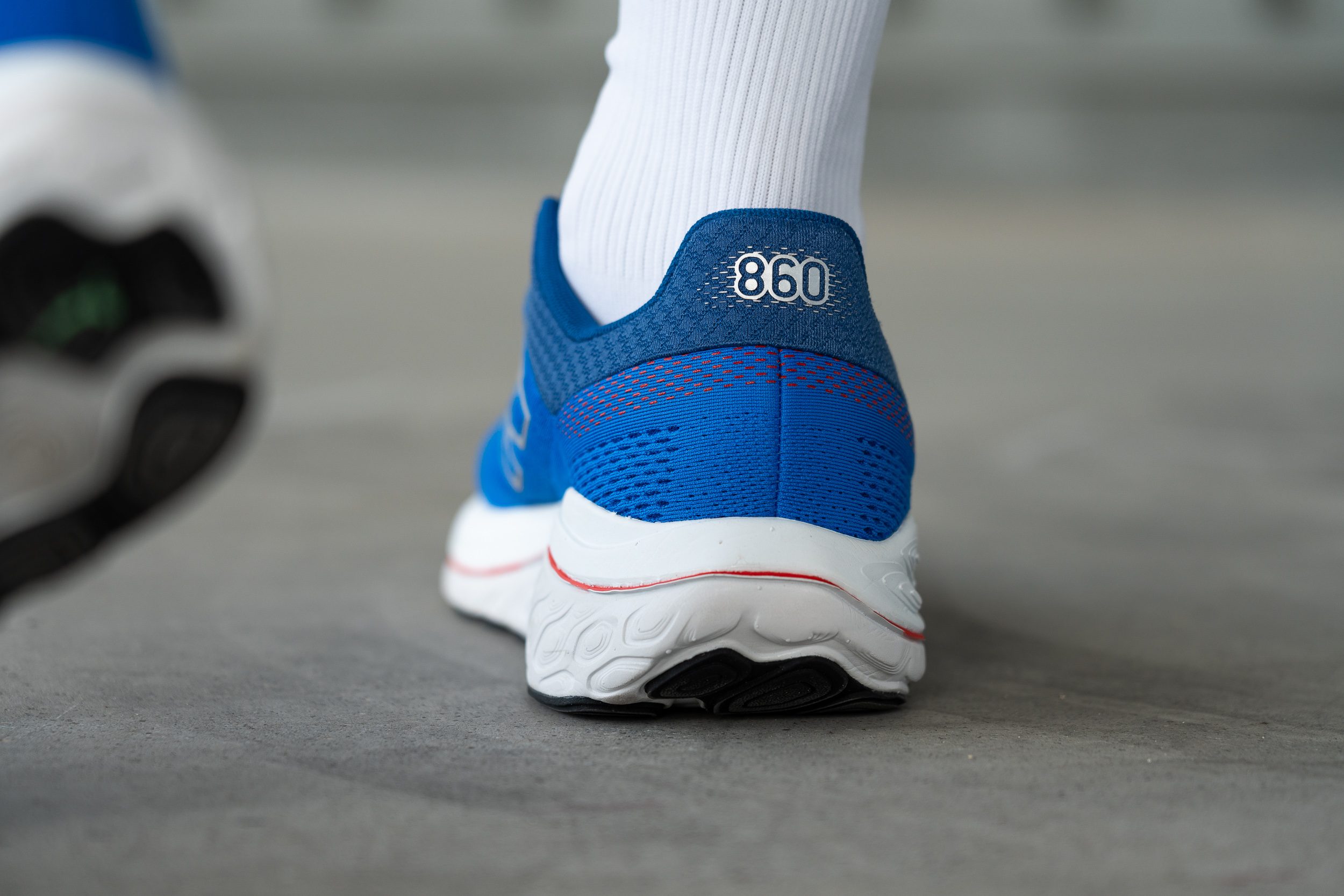
| Fresh Foam X 860 v14 | None |
Price
We found the price of the 860 v14 to be reasonable for the features and materials it offers. While it’s not an outstanding bargain, we believe it sits comfortably within a reasonable range. In our view, the shoe delivers enough performance to justify its cost, and we hope that New Balance maintains this pricing for future versions.
| Fresh Foam X 860 v14 | $140 |
| Average | $153 |

